

15 Essential Travel Skills: Learn to Travel Like a Pro
If you are ready to get the most from your travels, here are fifteen essential travel skills that will help you learn to travel like a pro. This guide will help you become a more savvy explorer. With the right travel skills, you can navigate the world with greater ease, connect more deeply with yourself and others, and make the most of every adventure.
As a certified travel coach with extensive experience both on the road and in guiding others, I’ve curated a list of the best skills for traveling, drawn from personal adventures and comprehensive research. If you’re ready to learn to travel more effectively, reduce stress on the road, and have more meaningful experiences, let’s dive into the essential skills every traveler should cultivate.
1. Curiosity
An open mind, gratitude , and a smile are perhaps the most significant skills to develop for meaningful journeys. It’s all about traveling and learning, engaging with new cultures, and finding joy in discovery. Curiosity drives us to learn from traveling , turning each trip into a lesson in life and humanity.
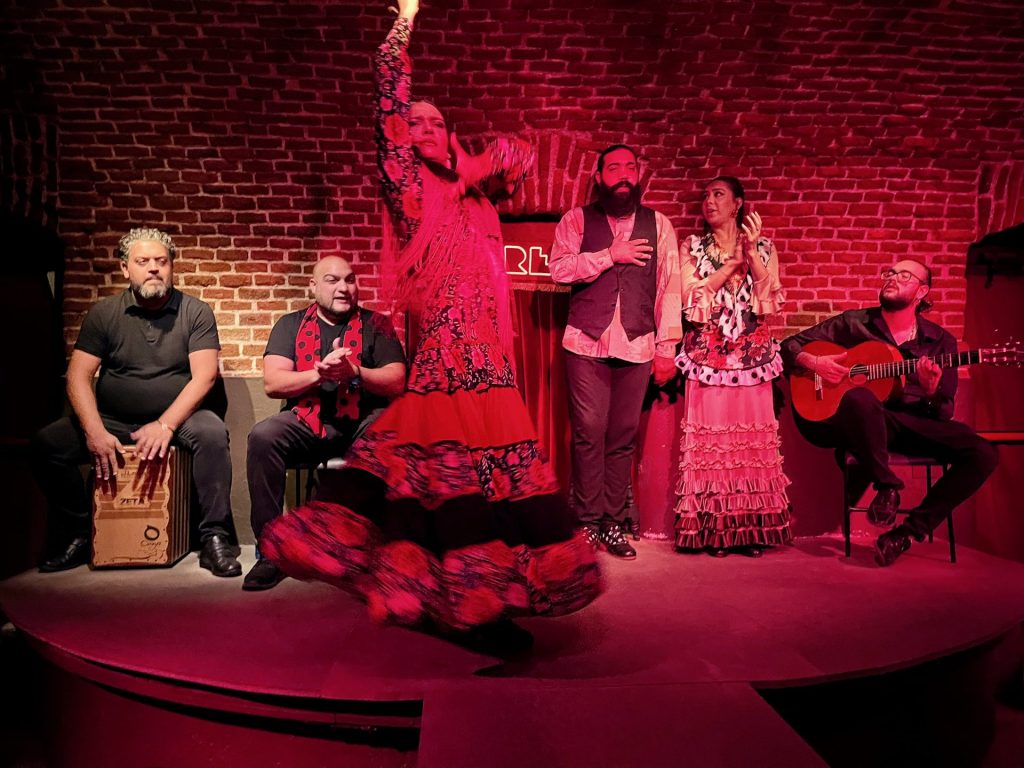
2. Flexibility
The ability to adapt to new situations and unexpected changes is crucial in travel. Surprises are part of the adventure and embracing flexibility means you can handle whatever comes your way with grace.
3. Choose the Best Destination
Your adventure begins with choosing where to go . Reflect on what you seek—culture, adventure, relaxation—and your deeper intentions for the trip. Learning about travel destinations can help inform your decisions, ensuring you pick the right spot for your aspirations.

4. Itinerary Planning
Once your destination is set, planning your itinerary is crucial. Research attractions, local customs, and your personal must-see sites. Balance is key – ensure you have a mix of activities, with ample downtime. Reflect back on your deeper intentions about your trip so that you craft a meaningful itinerary personal to you. Our step-by-step guide will have you planning your next trip like a pro.
5. Packing Like an Expert
Mastering the art of packing is essential. Learning what and how to pack ensures you’re prepared for your travels, focusing on both necessities and smart choices to make the most of your luggage space.

6. Language Basics
Communicating with locals enriches your travel experience. Our resources on learning new languages provide practical tips and tools, essential for any traveler aiming to immerse fully in new cultures. Learn how to travel with linguistic confidence, and connect on a deeper level wherever you go.
7. Budget Management
Learning how to allocate funds and find travel deals ensures your journey is both enjoyable and financially sustainable. Understanding how to create and follow your travel budget effectively allows you to enjoy your trip without financial stress.

8. Navigating Transportation
From local buses to international flights, understanding how to navigate transportation systems is a valuable skill. It grants you the freedom to explore confidently and immerse yourself in the local scene.

9. Health and Safety on the Road
Staying safe and healthy on a trip is paramount. Brainstorm a list of safety and health concerns before you leave and research potential solutions for each item. Look up local scams and safety issues. Consult with your medical team and any other professionals to come up with your personal plan to stay safe and healthy on your trip. Consider purchasing travel insurance.

10. Meaningful Sightseeing
Customize your sightseeing by focusing on what truly interests you and your personal reasons for travel. Learning to travel authentically might mean eschewing the typical tourist choices in favor of experiences that resonate with your curiosity and passions. Then come up with your own places you want to visit and get the best ideas to make the most of your visit. Find tips on visiting museums , UNESCO sites , literary sites , national parks , being your own tour guide and much more.
11. Cultural Etiquette
Understanding and respecting local customs and etiquette not only enriches your travel experience but also fosters mutual respect. It’s an important aspect of traveling skills, helping you navigate cultural interactions gracefully.

12. Ethical Travel
Take time before you leave to consider how your travels can best align with your values. This might mean carefully researching voluntourism opportunities since some are valuable but others should be avoided. It could also mean considering your environmental footprint, avoiding unethical animal tourism experiences, and supporting local economies with spending intentionally with locals.
13. Connection
Whether you are traveling solo, with friends, as a couple, as a family , or as a multi-generational group, there are lots of things you can do to enhance your trip.Travel is as much about the people as the places you see. Connecting with your travel companions, fellow travelers, and locals can enrich your journey in unexpected ways.

14. Capture Memories
Capturing memories, whether through photography, artwork, or writing is a valuable travel skill. Our nature travel photography article is designed to enhance your traveling skills. It’s one of the best skills for traveling, as it helps you preserve moments and share your experiences with the world. Reflecting on your experiences through writing can deepen your understanding and appreciation of the places you visit. Our guide on keeping a travel nature journal offers tips to get started, making it a valuable tool for traveling and learning.
15. Reach Long Term Travel Goals
Incorporating travel into your life more extensively may involve setting and reaching long-term goals. From creating travel vision boards to starting a travel-based business, there are myriad ways to make travel a core part of your existence.
Your Essential Travel Skills
Mastering these travel skills opens doors to deeper, more meaningful experiences. Whether you’re navigating a new city, connecting with locals, or soaking in the beauty of our planet, each skill enhances your journey, making every trip an opportunity for growth and discovery. As you start planning your next adventure, consider which skills you’re most excited to develop. Travel isn’t just about the destinations; it’s about the journey, the learning, and the transformation that occurs along the way. So, which skill are you excited to master next? Let us know in the comments, we’d love to hear from you!
Like it? Pin It!
Leave a Comment Cancel reply
Privacy overview.
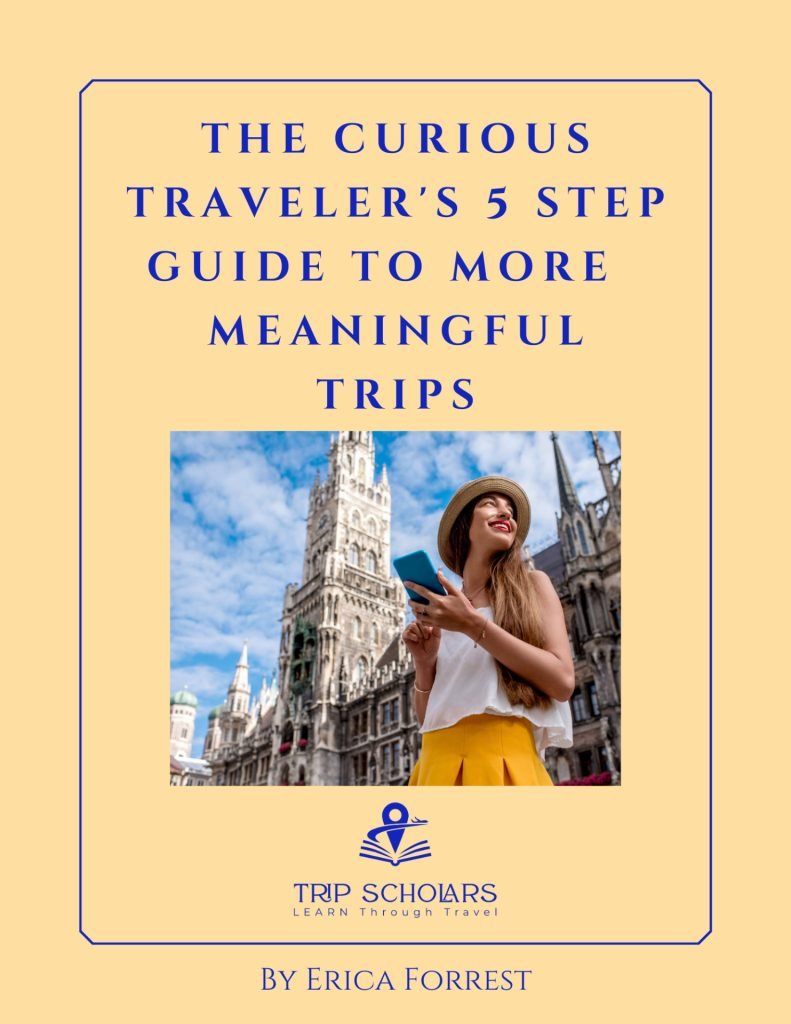
Get Your Free Gifts
We do not spam and you can unsubscribe anytime.
You have successfully joined our subscriber list.
- Your email is safe with us. We do not spam.
13 invaluable life lessons you learn through travel
Recently updated on August 1st, 2023 at 02:07 pm
Travel is one of life’s greatest teachers. It pulls you out of your comfort zone and plunges you into the unknown. It reveals a world of cultures to explore and people to meet. And it helps you develop virtues like patience and humility. So whether you explore a new neighbourhood or a new country, here are 13 of the best life lessons you can learn through travel.
1. To enjoy experiences over things

One of the greatest lessons you’ll learn through travel is that we need very little to be happy. And it’s not cars, phones or clothes that make us happy – it’s our experiences. A study published in the Journal of Psychological Science revealed that experiences provide more lasting happiness than material possessions. A Trafalgar study showed that 74% of people would rather have experiences over things. When you travel, you’ll form strong bonds with people, learn new skills and create lasting memories.
2. To leave your comfort zone and try new things

If you want to flourish in life, you must get out of your comfort zone and embrace the unknown. If you always stay in a well-worn routine, you’ll never truly expand your horizons. When you travel, you leave behind the familiar and take on a world of new things. You’re constantly learning through travel, with new cultures, friends, foods and languages. You may feel excitement or even fear, but usually never boredom… and it will be one of the most rewarding things you ever do.
GET INSPIRED BY: Splendours of Japan
3. To appreciate different cultures (and our similarities)

One of the best parts of travelling is experiencing different cultures. When you visit a new destination, you become immersed in a culture’s history, language, customs and cuisine. You’ll get to see famous landmarks like a historic temple or palace, take part in a traditional festival, eat at a local restaurant and even try speaking a few phrases. And as you explore the cultural differences, you may also come to find that we’re all not so different after all.
4. To be patient
Travelling teaches you not to sweat the small stuff. Whether you’re facing long lines at the airport or having trouble communicating in a foreign language, you’ll likely encounter many small frustrations on your journey. These little obstacles are a valuable lesson in patience, and at the end of your trip, you’ll be able to deal with almost anything.
GET INSPIRED BY: National Parks and Native Trails of the Dakotas
5. How to make friends with strangers

When you’re learning through travel, you open yourself up to a world of human interaction. Whether you’re meeting fellow travellers on the road or swapping stories over a glass of wine with a local, you’ll find plenty of people are open to chatting. Strike up a conversation, and you might just make a new friend. RELATED CONTENT: 5 benefits of solo travel (And how it will change your life for the better)
6. To never take nature for granted

One of the best things about travel is exploring the natural beauty of the world. On the flip side, you’ll also witness the fragility of our planet. You may visit destinations where clean drinking water is a luxury or where natural disasters have caused mass destruction. You may see forests disappearing, coral reefs dying, or glaciers melting before your eyes. When you travel, you learn to appreciate every natural wonder, every sip of clean water and every bite of healthy food.
GET INSPIRED BY: Best of Switzerland
7. To be spontaneous
You may be a rigid planner at home, but travel teaches you how to go with the flow. Your travel journey won’t always go to plan and when obstacles arise, you must embrace your impulsive side. Sometimes it’s better to let go of the schedule and take a spontaneous adventure. You never know what you may find, and that’s the beauty of it!
8. To appreciate the little things

We’re often so busy in our daily lives, we forget to appreciate the little things. When you travel, you take time to slow down and reflect on your experiences. You treasure the beauty of things we often take for granted, like watching the sunset, savouring a delicious meal, and cherishing your friendships. Travel teaches us it’s the little things that count.
RELATED BLOG: 3 ways Trafalgar’s Make Travel Matter experiences connect you to a destination
9. To be humble

When you open yourself to learning through travel, you are often humbled. You’ll realise just how small your footprint is in our enormous world. You’ll understand how lucky you are and how much you may take for granted in your daily life. You may also often encounter acts of kindness and generosity from strangers who have far less than you. Travel quickly teaches the value of humility.
10. The importance of smiling

We always advise Trafalgar guests to learn a few phrases in the local language before travelling to a new destination. It allows you to communicate more easily with locals and can spark some wonderful interactions. But for the times when words fail, you can always count on a smile. A genuine smile is a universal communicator and expresses friendliness and gratitude. Travel teaches that you can never go wrong with a smile.
11. How to think outside the box
When you travel, there will always be bumps in the road. Anything can happen, from getting lost or getting sick, to dealing with lost luggage or flight delays. You’ll often need to deal with problems without getting completely stressed out. Travel teaches you how to think creatively and adapt to all sorts of situations.
RELATED BLOG: What to pack: Travel Directors share their top tips
12. You are capable

One of the most important lessons you learn through travel is that you are more capable than you thought. Travel teaches you confidence, independence and freedom. It boosts your self-awareness and your problem-solving skills. Travel shows you that you can navigate a foreign country, make new friends, and overcome difficult situations. When you realise how powerful you are, your travel journey becomes one of the most transformative experiences of your life.
GET INSPIRED BY: Italy Belissimo
13. You never stop learning

“When you stop learning, you start dying” Albert Einsten
Just because we’ve left school doesn’t mean our education stops. Learning keeps us young, and travel is one of the greatest teachers of all. Travel inspires a sense of wonder and discovery, and there’s an entire world of things to do and people to meet. You could explore a forest or walk down a new street. Try a different cuisine or learn about another culture. When you travel, you never stop learning.
What life lessons have you learned through travel? Let us know in the comments below. ..
Want to hear more from us?
Sign up to receive inspiring travel articles, offers & news
" * " indicates required fields
Privacy Overview
Sign up for our emails.
- LATIN AMERICA & CARIBBEAN
- MIDDLE EAST
- US & CANADA
The Complete Beginner’s Guide to International Travel

So you’ve decided to travel internationally, have you? Traveling to another country is something I wish for everyone to experience at least once in a lifetime.
Unfortunately, not everyone has the privilege to do so. But for those of us with passports that allow us such opportunity, it’d be a shame to never explore an international destination in our great, big, beautiful world !
It might seem a bit scary to take your first international trip, but I promise it’s not that bad. To help you, I’ve put together this thorough guide on everything you need to know in order to have a successful international trip ! Let’s get straight to it.
Before You Depart for Your Trip
There’s quite a bit to get ready before your international trip. But, don’t worry. It’s all doable, and it’ll all be worth it!

Apply for a Passport
First things first. In order to travel internationally, you’ll need to have a valid, unexpired passport . On top of that, many countries require you to also have at least three or even six months validity left on your passport from your date of travel. So, if you don’t have a valid, unexpired passport or your passport is expiring in three to six months, it’s time to get a new passport before your trip. This process can take a couple months! So plan ahead, and submit your passport request early to save yourself stress and/or expediting fees closer to your departure date.
If this is your very first passport, your last passport was from when you were under 16 years old, your previous passport was lost, stolen, or damaged, or your last passport was from 15 or more years ago, you will need to apply for your passport in person. Here are the official steps for the new passport process .
If the above doesn’t apply to you, you simply have to renew your passport. You can do this via mail. Here are the official steps for the renewal process .
Choose Your International Destination
Yipee! Now that you’ve either already got your passport or have applied for a new one, you can choose your international travel destination. This is largely based on your own interests. But as this is your first trip internationally, keep in mind things like language, similarity in culture to back home, and ease of travel-related infrastructures (like trains or buses).
Apply for Any Visa(s)
Once you have chosen your destination(s), check whether you need visas or not . A visa is basically permission from a foreign government for you to be in their country. Some countries may grant you a free visa upon arrival with a simple stamp on your passport. Some countries simply require you to fill out a form online and pay a small fee before you can board your flight. And some countries require expensive visas which you must apply for months in advance. It all depends on that country you are visiting, your passport country, and how long you plan to stay. I love using Travisa ‘s free search tool to quickly and easily check what requirements exist for me before I book a flight.
Get Any Necessary Vaccines
Before confirming your destination, you should check if any vaccines are necessary for that place. Some vaccines are simply recommended for your own health, while others are requirements before you will be allowed into the country , or even allowed into other countries afterwards (like yellow fever). The CDC website is an easy way to check this. Some vaccines, like yellow fever, are low in supply and hard to get last minute. Others, like malaria pills, require a doctor’s prescription. So don’t leave this step until the last minute !
Check Travel Restrictions
Lastly, make sure there are no travel restrictions or decision-altering political tensions for your destination. Do this by checking the Travel Department site . Simply type in your destination country’s name into the search bar on the left hand side of the screen.
Preparing Your Finances
Now that your passport is on its way and you’ve settled on your international travel destination(s), it’s time to start thinking about finances.

Some destinations are very credit card friendly. Others operate on only cash and debit cards. And some don’t even have ATM machines! So you’ll need to do a bit of planning before departure to make sure you’re not stressing during your trip, and to save yourself transaction fees.
Get a No Fees Credit Card
Most banks charge a 3% fee every time you use your credit card to pay for a foreign transaction. As you can imagine, this adds up to a lot over the course of even a one week international trip. The good news is, many banks offer credit cards without foreign transaction fees . Do a quick internet search to see if your bank offers such a card.
Get a No Fees Debit Card
Most banks charge a 3% fee and $5 each time you withdraw foreign currency from an ATM. Especially if you are traveling to a mostly-cash destination, this is a surefire way to rack up unnecessary travel costs. To avoid this, consider opening a free brokerage account with Charles Schwab to also receive their debit card with zero transaction fees . I first heard about this card when moving to London to study abroad, and I have to say it’s served me well.
Get Foreign Currency Beforehand
Sometimes, but not often, it’s necessary to have cash in your destination’s currency either before you depart home or right when landing . This might be because your destination does not have ATMs, or because you just want to feel prepared.
If you need foreign cash before leaving home, head to your local bank and exchange currencies. (Just FYI, you’ll get a bad conversion rate doing this, since the bank needs to make commission.) If the currency you need isn’t a common one, your bank won’t have it on hand. In that case, you’ll have to request the exchange online with your bank.
Many countries that don’t have ATMs also don’t allow their currency to be taken outside their country (like Cuba). In this case, you’ll need to bring enough cash with you in a common currency (like USD, GBP, or Euro). Then, when you arrive at your destination’s airport, you can exchange your cash from home for the local currency.
Sign Up for Airline Rewards Programs
You might already know this if you fly domestically, but most airlines have rewards programs. These allow you to accumulate “miles” in your rewards account each time you fly. Eventually, you might rack up enough to redeem those miles in exchange for a flight !
Consider Travel Hacking
Now, some people use airlines rewards programs and racking up miles on steroids, and this is called travel hacking. Many airlines and banks offer huge amounts of miles when you sign up for a card, or offer miles every time you use that card for a purchase. This allows you to rack up enough miles for a free flight or hotel stay more quickly (or sometimes immediately!). I personally have no energy for travel hacking, as I’m not convinced the miles rewards are worth more in dollars than my current card’s cash reward system. But I would be amiss to not mention travel hacking in a guide to international travel.
Planning Your International Trip
Phew! Now that you’ve got all the annoying administrative work out of the way, it’s time for the fun stuff; planning your trip .

I have a whole ten-step guide to planning a trip , so I won’t go into too much detail here. But this can be broken down into planning out your travel itinerary, booking your flight, and booking your accommodation.
Create Your Dream Itinerary
Decide everything you want to see in that destination. I love using Pinterest , Instagram , and travel blogs for inspiration. This is my favorite part of planning a trip , because it gets me so excited about what’s to come! Then, figure out how many days each spot deserves if you are moving around, and figure out how to get from point A to point B (train, cab, ferry?).
Book Your Flight
After you’ve decided how many days you need, you can decide what your travel dates are and start looking for a flight. You can sometimes find good deals really close to the date, but that isn’t guaranteed. I recommend not leaving this until the last minute! I go into more detail how I search for cheap flights in my trip planning guide .
Book Your Housing
Once you have your flight booked, all that’s left is your housing. I love using Booking.com because of its interface, but any hotel search engine will suffice. Also consider AirBnB if you like the idea of staying in a local apartment, or Hostelworld if you’re looking for a social (and often budget-friendly) option. I go into more detail on different types of travel accommodation in my trip planning guide .
Here are some discounts if it’s your first time using AirBnB or Booking.com:
- Save 15% off your first booking by using this link to sign up for AirBnB for the first time.
- Get 10% back from your first booking when you use this link for your first time using Booking.com.
Preparing for Departure
Woohoo! You’ve got your passport, your trip is planned, and all that’s left is to depart. There are a couple things you should do to best prepare for your upcoming international trip.

Scan the Front Page of Your Passport
Before leaving home, make a copy of the front page of your passport (the page with your picture). Either print it out or send it to yourself via email. In case your passport gets lost, stolen, or damaged during your international trip, this makes it easier to have your passport replaced abroad at an embassy.
Expect Cultural Differences
Every country or region has its own culture and norms, and that’s what makes traveling so great. In some places, like the US, it’s common to greet strangers “hello,” or for shop associates and waiters to be extra doting. In other places, like much of Europe, the slower cafe and restaurant culture means your waiter might not come to you unless beckoned. It’s almost seen as if the waiter is rushing you! Similarly, in Japan, it’s offensive to tip waiters, as it suggests their only incentive to do their job well is receiving your pocket change. No culture is right or wrong, but keep an open mind as you travel, and don’t assume something means the same as it does back home .
Prepare for Language Barriers
Many popular travel destinations have adopted English as a common language due to how many international tourists they receive. So, if you know English, chances are you’ll be fine getting around many travel destinations around the world. But it still doesn’t hurt to learn some basic words in your destination’s language .
Saying “hello” or “thank you” in a person’s mother tongue can go a long way in warming them up towards you. Learning common menu items or words on train station signs will also likely make your life easier and give you more confidence abroad. I love using the free version of Duolingo’s mobile app ( iOS and Android ) for a few weeks before I head somewhere new to learn a language’s basics. Alternatively, you could simply head to Google translate and jot down key words on a small piece of paper before you depart. Then, keep this paper handy while you’re out exploring for easy access.
What to Expect on an International Flight
Even if you’ve flown domestically before, flying internationally can be a whole different experience . Here are my top tips for flying internationally.

What to Pack in Your Carry On
Packing carry on luggage for an international trip is similar in many ways to for a domestic trip. The same rules apply with regards to liquid sizes and electronics. However, as international flights tend to naturally be longer than domestic flights, there are a few extra considerations.
Make sure you are comfortable. Bring your own favorite headphones instead of using the uncomfortable free or for sale ones on board the flight. Also bring an eye mask (and a neck pillow if you need that) so that you can try to sleep a bit. You’ll also want to pack clothing items like one pair of pajamas and one or two proper outfits, in case your luggage is lost or delayed . It would be super inconvenient to buy these things right after you land in a foreign country!
Common Flight Etiquette
No one likes flying. So to make it easier on everyone, here are some best practices for being polite while in the airport and on the plane.
- While in the airport, don’t stand up and crowd around the gate way before your boarding group is called. Everyone will get their chance to board.
- Once on the plane, the middle seat person gets dibs on the inner arm rests .
- Right after the plane lands, don’t rush to pull your luggage from the overhead before the plane doors have even opened (especially if you’re in the back of the plane!). If you’re in a rush to catch a connection you think you might miss, ask the flight attendants before landing if they can help you get off first. Sometimes they’ll make an announcement that everyone should stay seated until those about to miss a connection exit first!
Staying Healthy While Flying
The last thing you want is to get off your flight and feel unwell the first days of your epic trip! Here are precautions you should take to ensure you land in tip-top shape.
- Stay hydrated . Airplane air has less humidity (only about 10 – 20%!), so make sure you are drinking enough water, especially on long haul flights. I always bring a large, refillable water bottle when I fly. I fill it up at an airport water fountain right after passing security and finish it all before boarding. Then, I refill it again to have a full supply while on board. This is important not only for headaches and such, but also to prevent skin breakouts in the days after landing.
- Keep the blood flowing . Not only are you not moving for hours upon hours when flying internationally, but your feet are flat on the floor the entire time, too. This isn’t great for blood circulation, and can cause swelling in your ankles and feet the days after your land. (It’s also just not good for your health to not move!) So, make it a point to get up and walk around the plane. Since you’ll be drinking a lot of water anyways, maybe walk up and down the aisles for some minutes each time you finish using the toilets. Do some stretches , like pulling your feet up to your booty one at a time and holding, or lifting each knee up and holding. If you have a layover with enough time, walk around the terminal for some time before boarding your second flight.
- Stay clean . Even pre-Covid-19, planes and airports have never been the cleanest places to be. Wash your hands frequently with soap, use hand sanitizer , and consider disinfecting your food tray, screen, and arm rests right after getting on board. Make sure not to touch or pick your face too much, especially since it’s already dealing with the dehydrating air!
Flying with Dietary Restrictions
Airplane food is pretty much never great, especially if you aren’t flying first class. But if you’re on a particular diet or have dietary restrictions, you’ll need to plan ahead of time. Consider packing some of your favorite nutritious snacks instead of relying on the salty pretzels you can expect on board. If you have a specific need, like vegan meals, call the airline 24 hours before your flight to put in your request for a special meal . You might also want to double-check the meal request before take off at the gate.
Staying Safe While Traveling Internationally
While the world isn’t the big, bad, scary place we’re often made to believe, that doesn’t mean travel is free of risks.

A lot of the safety precautions and considerations you should take while traveling abroad are similar to those you take at home. But a few aren’t. Here are my main safety tips for international travel.
Solo Travel
By its very nature, traveling alone is more risky than traveling with a companion. Is it significantly more risky? I think not. But that’s not to say you shouldn’t take any extra precautions when traveling alone.
One precaution I take is to always let someone know where I am . If I have a full itinerary planned, I send my mom a summary of each city and accommodation I plan to stay at. If I’m doing something like a hike without any new friends I’ve met, I’ll let the front desk know my plans before I head out. I also try to be confident . Even if I don’t know where I’m going, I try to look like I do! If I need to look directions up on my phone, I might do it before leaving the hotel or shop or restaurant.
Another thing to remember is that traveling solo is not traveling alone . Especially if staying in hostels, you’ll meet other people traveling solo like you are, and you can do activities with them.
Solo Female Travel
Something my loved ones tell me often is how it’s so unsafe to travel alone as a woman. But the truth is, is it perfectly safe to be a woman anywhere in the world? Even when I’m in in the comfort of my home country, I rush to my car when in public garages at night, receive uncomfortable comments from strangers on the street, and face the potential of sexual harassment or even assault. Sexism exists everywhere, not just abroad. Of course, I do take extra precautions as a solo female traveler compared to a male solo traveler. But I also take extra precautions as a female in my home country, too.
These are some of the precautions I take while traveling as a woman, in addition to the precautions I take for traveling solo in general:
- I never walk alone past dark . Ever, ever. Even if I “feel” safe in a place (which is most of the time), it’s just something I’ve promised myself I wouldn’t do.
- I try to dress conservatively in certain destinations. Especially as a Californian, I’m used to super short shorts and low-cut shirts being totally normal. While these are still often acceptable abroad, they definitely cause a lot of stares that I personally have decided I’d rather avoid if I can. So, I’ll wear looser, longer shorts instead of tight short-shorts, or midi skirts and dresses instead of what I consider normal length. This isn’t so much because I feel unsafe, but because I’ve realized it decreases bothersome male comments and advances immensely.
- I haven’t actually done this yet, but it’s a trick I have in my back pocket. Bring a fake wedding ring . Depending on the destination, this can help ward off some comments (and even playful marriage proposals!).
Traveling as a Person of Color
Similar to the solar female travel issue, a lot of my family fear that I’ll stand out like a sore thumb as a black woman. Also similar to the solo female travel issue, racism is simply something that exists everywhere, not just abroad . Of course, I do take extra precautions as a black solo traveler compared to a white solo traveler. But I also take extra precautions as a black person in my home country, too.
The main extra consideration I take while traveling as a person of color is to research the experiences of other black people or black women in destinations I know less about , or that I know have few black people or tourists. I recommend you do the same for whatever race or ethnicity you might identify with, as destinations might be used to one group but not a different group. This, of course, can be difficult, as the voices in the travel sphere are mostly white men, and next white women. (This is why it’s important to have better representation.) If you can’t find the insight you need online, consider directly emailing or messaging any travel writers or influences whose experiences you’d like to hear.
Traveling with Cash and Valuables
Like you would in certain areas of your home country, don’t flash valuables while traveling. Be cognizant as you withdraw or exchange any cash . Being a tourist can make you a target already, so don’t give pickpockets any extra incentive!
Be careful not to carry all your cash and cards in one place. If you can, take some with you as you explore, and then leave back up cards, unneeded cash, and your passport back in a safe in your accommodation . That way, if anything gets stolen or lost while out exploring, you have back ups to hold you over.
Bring Locks for Hostels
If you are planning on staying in hostels, definitely purchase a lock before your trip. Hostels usually have lockers, but charge a couple bucks to rent a lock. It’s much more economical to purchase once and not pay each time.
Register with Your Country’s Embassy
This is a step I never usually did before, but one I’ll be doing every time in the future! I was “one of those” people who got stranded abroad in a foreign country when the world started closing borders in response to Covid-19. I always thought registering with the local embassy for my country was a waste of time, but this turned out to be the best way to get up-to-date information on the situation. After missing out on crucial info once, I signed up. And it’s thanks to that I was able to eventually get home!
You never know what could happen when you are abroad, whether that is a pandemic, weather-related disaster, local protests, or political tensions. It’s near-impossible to keep up with your foreign destination’s news while traveling. So registering with your embassy is an easy way to get a simple email for key things you should know . For Americans, this program to register is called the Smart Traveler Enrollment Program (STEP) , but other countries have pretty much the same thing.
Get Travel Insurance
I’m not sure I believe “everyone” should “always” get travel insurance. But for a first trip abroad, it’s worth considering. I typically never purchased it when I traveled places I knew well. But these days, as I’m no longer on my parents’ good insurance, and as I travel mostly solo, I do purchase travel insurance. It often only costs a couple dollars a day , and usually covers lost baggage, medical visits for accidents or illnesses, theft, and more. Especially if you are planning adrenaline activities or traveling somewhere distant, you should consider it!
What Do You Think About My International Travel Guide?
And there ya have it, folks! Are you feeling prepared for your international trip! I hope this guide was helpful. If you still have more questions before your trip abroad, definitely comment below and I’ll answer. Or, if you have any advice you think I missed that others should know, please also comment below!
Save This Guide to Return to Later on Pinterest

Further Reading...

How to Plan the Perfect Vacation: 10 Step Guide

20 Trips to Take in Your 20s

Complete Guide to Flying RyanAir (& Not Getting Ripped-Off)
No comments, leave a reply cancel reply.
Save my name, email, and website in this browser for the next time I comment.
This site uses Akismet to reduce spam. Learn how your comment data is processed .
13 Top Attractions and Things to Do in Vienna, Austria
25 top attractions and things to do in san francisco, that travelista.

- PRO Courses Guides New Tech Help Pro Expert Videos About wikiHow Pro Upgrade Sign In
- EDIT Edit this Article
- EXPLORE Tech Help Pro About Us Random Article Quizzes Request a New Article Community Dashboard This Or That Game Popular Categories Arts and Entertainment Artwork Books Movies Computers and Electronics Computers Phone Skills Technology Hacks Health Men's Health Mental Health Women's Health Relationships Dating Love Relationship Issues Hobbies and Crafts Crafts Drawing Games Education & Communication Communication Skills Personal Development Studying Personal Care and Style Fashion Hair Care Personal Hygiene Youth Personal Care School Stuff Dating All Categories Arts and Entertainment Finance and Business Home and Garden Relationship Quizzes Cars & Other Vehicles Food and Entertaining Personal Care and Style Sports and Fitness Computers and Electronics Health Pets and Animals Travel Education & Communication Hobbies and Crafts Philosophy and Religion Work World Family Life Holidays and Traditions Relationships Youth
- Browse Articles
- Learn Something New
- Quizzes Hot
- This Or That Game New
- Train Your Brain
- Explore More
- Support wikiHow
- About wikiHow
- Log in / Sign up
How to Travel
Last Updated: December 8, 2023 References
This article was co-authored by Carmela Resuma, MPP . Carmela is the Executive Director of FLYTE, a non-profit organization headquartered in Georgetown, Texas that empowers students living in underserved communities through transformative travel experiences. Carmela has a Masters in Public Policy Analysis from New York University and is passionate about youth empowerment, social impact, and traveling. There are 10 references cited in this article, which can be found at the bottom of the page. This article has been viewed 148,076 times.
You know you're ready to hit the road and see the world, but you need a little help getting out the door. With some thought and careful planning, you can be headed for adventure sooner than you think. Start planning your escape!
Deciding Where and When to Go

- Remember that in addition to any travel expenses, you still have to pay rent and bills at home. Make sure you have enough to cover these essentials before you spend money traveling.
- Be savvy and cut out small, unnecessary purchases where you can. Eating in, avoiding ATM fees and skipping the $4 lattes are all quick, easy changes you can make to save extra cash for traveling.
- If you can't afford to jet to a distant location but you're itching to explore, research where you can go that is within a day's drive of home. Search for national parks, weird roadside attractions, or even look at a travel guide for your area. If you don't have wheels you can rent a car or take a bus to get away for the day.

- Don't forget to factor in travel time--if you only have a long weekend, it might be best to stick relatively close to home. You can determine the percentage of your vacation you will spend traveling by dividing the total number of hours you spend on the road by the total number of hours you plan to spend at your destination. [1] X Research source

- High season is when there are the biggest crowds, the best weather, attractions selling out, and the highest prices.
- Low season usually means great deals, fewer tourists, the possibility of terrible weather, and the risk of some attractions being closed. You may also find that locals are a little more welcoming.
- Shoulder season is considered the best time to travel. You get the best of both worlds--you will miss the crowds, snag the good deals, and still have good weather. Book right before or right after high season to take advantage of shoulder season. [3] X Research source

- Many travel websites will include inspiration and ideas for different types of trips: family, ecotourism, road trips, and more. Try a website like Triptuner that will give you suggestions based on your preferences.
- Ask friends and family about places they've been. They may have some great recommendations and insights on what to do, where to stay, and what to eat.
Preparing for Your Trip

- Research the cost of the activities that interest you--look up the admission fee to the Musée d'Orsay or the price of a ticket to a Broadway show. The more accurate you can be with costs, the better you can plan your trip.
- Many cities offer some kind of tourism pass, which, for a flat fee, grants free or discounted entry into popular attractions like museums, tours, and historical sites. [5] X Research source
- If your plans exceed your budget, you may need to make a few sacrifices. Stay at a hostel instead of a hotel or skip the four star restaurant. Being flexible will make it easier to stick to your budget.
- Don't forget to look up the money conversion rate if you're going abroad and work that into your budget.

- Be sure you have plenty of time to switch planes if you have a layover in another city.
- Studies have shown the best time to buy a ticket for a domestic flight is between 100-50 days (3.3-1.5 months) before to your departure date. Tickets for international flights are usually lowest between 171-50 days (5-1.5 months) before travel. [6] X Research source
- If you're not sure how you want to get to your destination, a website like Rome2Rio will give you estimated cost and travel times for just about every mode of transportation.
- Train travel is big in Europe, and websites like Seat61 can help you plan a route and look for deals.

- There are even ways to arrange for a free place to stay--sign up at couchsurfers.com to crash with someone local, or try WWOOFing (World Wide Opportunities on Organic Farms) to exchange work for room and board.
- Make reservations ahead of time. It may decrease the spontaneity of your trip, but it's no fun to arrive and find every hostel in town is booked for the night and you have nowhere to sleep.

- Researching the transportation system will make it easier to plan and budget your time. Learn how the metro works before you visit Paris, or find out which train lines will take you to Pisa from Florence and how long the trip will take. [8] X Research source
- Add the addresses and contact numbers of any hotels, car rental agencies, so you have them in one place and can reference them quickly.
- Share your itinerary with your family, and include all your travel information. It's important someone knows where you are and how to reach you in case of an emergency.
- Email your itinerary to yourself so it's easily accessible.
Carmela Resuma, MPP
Try to make the first 24 hours as stress-free as possible. Make sure you have very reliable transport from the airport to wherever you're going and a nice place to stay, even if it costs a little more. Having that first day planned out will help reduce your stress.

- Pack light. Pick basic clothes that coordinate so you can mix and match over the course of your trip.
- If you are flying, remember the safety restrictions, including the 3-1-1 rule: each passenger can have one 1-gallon bag of liquids, gels, or creams, each in a 3.4oz container. Most drug stores sell travel-sized shampoos and moisturizers you can pack.
- Make sure you pack any medications you take and that you have enough for your entire trip, plus a little extra.
- Other must-haves: a light rain jacket, a back-up battery for your phone or other electronics, something to read or pass the time on flights and bus rides.
- Consider the weather. It might be snowing outside, raining cats and dogs, windy, or it might be as hot as the desert sun. Well, it all depends on the weather, and so the type of weather is the type of weather activity you'll be doing.
- Roll your clothes up when packing. Don't fold your clothes-roll them up! You'll have tons more space in your bag. To make things even easier, roll up each outfit into one big roll. That way, you can grab the whole thing at once, no search required.
International Travel

- It is possible to expedite the process and get your passport sooner than 4-6 weeks (even as quickly as 24-hours in an emergency), but you will have to pay an extra fee.
- If you are renewing your passport, you can skip the lines and submit by mail.
- When you receive your passport, scan a copy and email it to yourself. You may also want to make a photocopy and keep it in your suitcase. These copies will be very helpful if your passport is lost or stolen while you're out of the country.
- Keep your passport somewhere safe while you are traveling--a jacket with an inside pocket or a money belt that goes under your shirt can keep you from losing your passport or having it stolen.

- You may need to arrange your hotel accommodations before applying for a visa and be asked to present the address and contact information when you apply.

- Vaccines can take several weeks to start working, or you may need multiple doses, so don't wait until the last minute. See your doctor 4-6 weeks before travel. [10] X Research source
- You can also visit a travel clinic for vaccines--the staff specializes in travel medicine and will be well-versed in what precautions you should take while abroad. [11] X Research source

- English is common as a second language in many countries, but you should never assume everyone will be fluent.

- Pay attention to things like how locals typically dress (some countries are more modest than others and you may get unwanted attention by showing skin), if tipping is expected, and how much "personal space" is normal (you may find people stand and talk much closer than you're used to).
- Check for travel warnings or alerts for the country you plan to visit. You may learn that certain areas are experiencing conflict or are considered unsafe to visit and decide to alter your plans.

- Ask your bank if they have any international partners or branches you can visit. The fees for ATM withdraws in foreign countries are fairly high and can add up quickly. [12] X Research source
- Using your ATM card for withdraws will almost always get you the best exchange rate. Just watch for those fees. [13] X Research source
Community Q&A
- Keep a journal. You may think you'll remember every amazing moment of your trip, but chances are you'll be having so many new experiences it may be hard to keep track of it all. Thanks Helpful 2 Not Helpful 0
- Take lots of pictures. You can always delete bad ones later, but you won't have another chance to snap a shot of that monkey sitting on your friend's head. Thanks Helpful 2 Not Helpful 0
- Protect your devices. If your device has a camera, write down a parent's cell number or e-mail address (ask permission first) and take a picture of it, along with a polite note asking the finder to get in touch. Set your home screen to that image so that if your device is lost you might get it back. Then find a small crossbody bag with a zipper top, and use it to carry your device and sunscreen. When you don't have your bag, pick a spot where you will always place your device when it's not in your hand - in the inside pocket of a beach bag, for example. Thanks Helpful 0 Not Helpful 0

You Might Also Like

- ↑ https://traveltips.usatoday.com/decide-vacation-12765.html
- ↑ https://www.smartertravel.com/low-season-low-cost-five-tips-for-off-peak-travel/
- ↑ https://www.travelandleisure.com/articles/shoulder-season-travel-secrets
- ↑ https://traveltips.usatoday.com/set-budget-travel-14231.html
- ↑ https://www.thrillist.com/travel/nation/how-to-quit-your-job-and-travel-tips-on-making-your-money-go-further
- ↑ https://www.forbes.com/sites/grantmartin/2014/12/09/best-days-to-book-flights-are-tuesdays-50-100-days-before-travel-expedia-study-concludes/
- ↑ https://www.yahoo.com/travel/the-smartest-ways-to-avoid-travel-burnout-116278797137.html
- ↑ https://www.cdc.gov/vaccines/vpd-vac/yf/
- ↑ https://wwwnc.cdc.gov/travel/page/find-clinic
- ↑ https://www.independenttraveler.com/travel-tips/money-and-insurance/atms-abroad
About This Article

If you want to travel, start by choosing a destination and deciding how much time you can spend there. Take into consideration factors like your travel time, paid time off, and any obligations you have at home. If you are flying, book your flight early since they are usually cheapest 50-100 days in advance. Then, search online for activities you'd like to do and the cost of food so you can make a budget. To save money, consider cooking your own meals and staying at campgrounds or hostels instead of at resorts. To learn how to prepare for an international trip, read on! Did this summary help you? Yes No
- Send fan mail to authors
Did this article help you?

Featured Articles

Trending Articles

Watch Articles

- Terms of Use
- Privacy Policy
- Do Not Sell or Share My Info
- Not Selling Info
wikiHow Tech Help Pro:
Develop the tech skills you need for work and life
- Online Degree Explore Bachelor’s & Master’s degrees
- MasterTrack™ Earn credit towards a Master’s degree
- University Certificates Advance your career with graduate-level learning
- Top Courses
- Join for Free
Build Essential Travel Skills
The travel courses we offer are designed to provide you with the necessary knowledge and skills to excel in the dynamic field of travel and tourism. Whether you aspire to become a travel agent, tour operator, hospitality manager, or simply want to enhance your understanding of the travel industry, our courses will equip you with the latest insights and expertise in this ever-evolving sector.
The language used throughout the course, in both instruction and assessments.
Choose the Travel Course That Aligns Best With Your Educational Goals
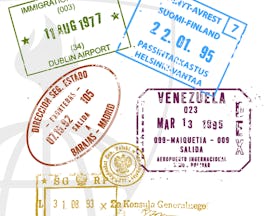
Johns Hopkins University
International Travel Preparation, Safety, & Wellness
Skills you'll gain : Leadership and Management, Culture
(417 reviews)
Beginner · Course · 1 - 4 Weeks

University of California, Davis
Spanish Vocabulary: Sports, Travel, and the Home
Skills you'll gain : Communication, Writing
(269 reviews)

Coursera Project Network
File Editor Time Travel with Linux
Skills you'll gain : Linux
Beginner · Guided Project · Less Than 2 Hours

Vanderbilt University
ChatGPT Advanced Data Analysis
Skills you'll gain : Data Analysis
(303 reviews)
Beginner · Course · 1 - 3 Months

University of Illinois at Urbana-Champaign
Accelerated Computer Science Fundamentals
Skills you'll gain : Computer Programming, C Programming Language Family, Data Structures, Algorithms, C++ Programming, Theoretical Computer Science, Programming Principles, Computational Thinking, Problem Solving, Computer Programming Tools, Critical Thinking, Computational Logic, Graph Theory
(3.3K reviews)
Intermediate · Specialization · 1 - 3 Months

OpenAI GPTs: Creating Your Own Custom AI Assistants

Soporte de Tecnologías de la Información de Google
Skills you'll gain : Communication, Computer Networking, Computer Architecture, Network Security, Operating Systems, Networking Hardware, Security Engineering, Network Architecture, Software Security, Human Computer Interaction, Security Software, Software-Defined Networking, System Software, Theoretical Computer Science, Cloud Computing, Data Management, Computational Logic, Network Model, Customer Support, System Security, Security Strategy, Cryptography, Problem Solving, Programming Principles, Adaptability, Linux
(16K reviews)
Beginner · Professional Certificate · 3 - 6 Months

Università Bocconi
Management of Fashion and Luxury Companies
Skills you'll gain : Brand Management, Leadership and Management, Marketing, Retail Sales, Strategy, Business Analysis, Communication, Design and Product, Market Analysis, Media Strategy & Planning, Product Management
(5.7K reviews)
Mixed · Course · 1 - 3 Months

École Polytechnique
Étudier en France: French Intermediate course B1-B2
Skills you'll gain : Communication, Culture, Writing
(4.7K reviews)
Intermediate · Course · 1 - 3 Months

Learn Spanish: Basic Spanish Vocabulary
Skills you'll gain : Communication, Writing, Culture
(3.6K reviews)
Beginner · Specialization · 3 - 6 Months

University of Colorado Boulder
Foundations of Data Structures and Algorithms
Skills you'll gain : Algorithms, Theoretical Computer Science, Data Structures, Computer Programming, Graph Theory, Problem Solving, Computational Logic, Computational Thinking, Mathematical Theory & Analysis, Mathematics, Applied Mathematics, Python Programming
Make progress toward a degree
(448 reviews)
Advanced · Specialization · 1 - 3 Months

Aspectos básicos: Datos, datos, en todas partes
Skills you'll gain : Data Analysis, Databases, Business Analysis, Data Management, Exploratory Data Analysis, Process Analysis, Data Analysis Software, Data Structures, SQL, Spreadsheet Software, Strategy, Microsoft Excel
(6.1K reviews)
Searches related to travel
In summary, here are 10 of our most popular travel courses.
- International Travel Preparation, Safety, & Wellness : Johns Hopkins University
- Spanish Vocabulary: Sports, Travel, and the Home : University of California, Davis
- File Editor Time Travel with Linux : Coursera Project Network
- ChatGPT Advanced Data Analysis : Vanderbilt University
- Accelerated Computer Science Fundamentals : University of Illinois at Urbana-Champaign
- OpenAI GPTs: Creating Your Own Custom AI Assistants : Vanderbilt University
- Soporte de Tecnologías de la Información de Google : Google
- Management of Fashion and Luxury Companies : Università Bocconi
- Étudier en France: French Intermediate course B1-B2 : École Polytechnique
- Learn Spanish: Basic Spanish Vocabulary : University of California, Davis
Frequently Asked Questions about Travel
What is travel .
Travel refers to the act of moving from one place to another, typically by means of transportation such as air, land, or sea. It involves going to different locations, either within one's own country or internationally, for various reasons such as leisure, business, education, or exploration. Travel allows individuals to experience new cultures, environments, and activities, broadening their perspectives and providing opportunities for personal growth. It can involve planned itineraries or spontaneous journeys, and can be done individually, with a group, or through travel agencies. Overall, travel offers a chance to discover and learn about different places, people, and customs, making it an enriching and educational experience.
What skills do I need to learn for Travel?
Some of the skills you need to learn for traveling include:
Language skills: Learning the local language of the countries you plan to visit can be incredibly beneficial in terms of effectively communicating with locals, understanding the culture, and navigating your way around.
Geography and navigation: Developing a good sense of direction and having knowledge of maps, landmarks, and GPS usage can help you navigate your way through unfamiliar territories.
Cultural awareness: Gaining cultural competency and sensitivity is important for respecting traditions, customs, and norms of the places you visit. This includes understanding etiquette, religious practices, and social norms.
Organization and planning: Traveling requires careful planning, as you need to manage budgets, itineraries, transportation, accommodation, and more. Developing organizational skills can help ensure a smooth and enjoyable trip.
Adaptability and problem-solving: Being adaptable to unforeseen circumstances and being able to find solutions to unexpected challenges while traveling is crucial. It helps you stay calm, think on your feet, and make the most out of any situation.
Basic first aid and safety: Knowing basic first aid skills and being aware of travel safety tips can help you effectively deal with minor injuries, illnesses, or emergencies that may occur while traveling.
Budgeting and money management: Being able to manage your finances while traveling is essential. Learning skills like budgeting, tracking expenses, and finding the best deals can help you make the most out of your travel budget.
Photography and storytelling: Capturing memories and telling stories through photography can be a great way to document your travel experiences. Learning basic photography techniques and visual storytelling can add an extra dimension to your trip.
Intercultural communication: Developing good interpersonal skills and the ability to connect with people from different backgrounds and cultures can lead to meaningful interactions and enriching travel experiences.
- Research and planning: Being proficient in conducting online research and efficiently planning your trips can help you find the best destinations, attractions, accommodations, and travel options that align with your interests and preferences.
Remember, these skills can vary depending on the specific type of travel you plan on doing (solo backpacking, luxury travel, adventure travel, etc.) and the destinations you intend to visit.
What kinds of jobs can you get with Travel skills?
There are several job opportunities available for individuals with travel skills. Some of the potential careers include:
Travel Agent/Consultant: With expertise in travel, you can work as a travel agent or consultant. This involves assisting clients in planning and organizing their trips, making reservations, and providing travel advice.
Tour Guide: As a tour guide, you can lead people on sightseeing trips, historical tours, or adventure excursions. This job allows you to share your knowledge of different locations and cultures with others.
Flight Attendant: If you enjoy travel and working in the airline industry, becoming a flight attendant might be an excellent option. With travel skills, you can excel in this role, ensuring a pleasant experience for passengers on flights.
International Aid/Relief Worker: Many organizations such as non-profits and charities require individuals with travel skills. You can utilize your knowledge to work in diverse locations, providing assistance and support during humanitarian crises or development projects.
Event Planner: Event planning often includes arranging travel logistics for attendees, especially for conferences, trade shows, and destination weddings. Your travel expertise can help in coordinating travel arrangements for guests and managing overall event logistics.
Travel Writer/Blogger: If you have a passion for writing and travel, combining both can lead you to a career as a travel writer or blogger. You can share your experiences, offer travel tips, and provide valuable insights to inspire others.
- Hospitality Manager: With travel skills, you can pursue a career in the hospitality industry. As a manager, you would oversee hotel operations, ensuring guests have a smooth experience and overseeing staff and services.
These are just a few examples, and there are numerous other job possibilities for individuals with travel skills. It ultimately depends on your specific interests, qualifications, and the industries you wish to work in.
What kind of people are best suited for studying Travel?
People who are curious, adventurous, and have a passion for exploring new places and cultures are best suited for studying Travel. They should have a desire to learn about different destinations, their histories, and the various aspects of the travel industry. Additionally, individuals who possess good communication and interpersonal skills, as well as a willingness to adapt to different environments, will excel in this field.
What topics can I study that are related to Travel?
There are several topics related to travel that you can study. Some of these include:
Tourism and Hospitality Management: This field focuses on the management and operation of travel businesses, such as hotels, resorts, airlines, and travel agencies.
Cultural Tourism: This topic explores the cultural aspects of travel and how tourism impacts local communities. It covers subjects like heritage preservation, cultural exchange, and sustainable tourism practices.
Travel Journalism: If you have a passion for writing, you can study travel journalism, which includes learning how to write engaging travel articles, blogs, or even produce travel documentaries.
Geographic Information Systems (GIS) for Travel: GIS technology plays a crucial role in travel planning and analysis. By studying GIS, you can learn how to effectively use spatial data to enhance travel experiences, map destinations, and analyze transportation networks.
Sustainable Tourism: This topic focuses on responsible tourism practices, including minimizing environmental impact, supporting local communities, and promoting sustainable development in travel destinations.
Event and Conference Planning: If you're interested in organizing travel-related events, studying event and conference planning can provide you with the necessary skills and knowledge to successfully plan and execute travel-related conferences, trade shows, or exhibitions.
- Travel Photography: For those who enjoy capturing moments and sharing travel experiences through visual storytelling, studying travel photography can help you enhance your skills in composition, lighting, and post-processing techniques.
Remember, there are numerous other specific travel-related courses and skills you can study based on your specific interests and career goals.
What are the benefits of taking an online Travel course?
Online Travel courses offer a convenient and flexible way to enhance your knowledge or learn new Travel refers to the act of moving from one place to another, typically by means of transportation such as air, land, or sea. It involves going to different locations, either within one's own country or internationally, for various reasons such as leisure, business, education, or exploration. Travel allows individuals to experience new cultures, environments, and activities, broadening their perspectives and providing opportunities for personal growth. It can involve planned itineraries or spontaneous journeys, and can be done individually, with a group, or through travel agencies. Overall, travel offers a chance to discover and learn about different places, people, and customs, making it an enriching and educational experience. skills. Choose from a wide range of Travel courses offered by top universities and industry leaders tailored to various skill levels.

What Travel courses are best for training and upskilling employees or the workforce?
When looking to enhance your workforce's skills in Travel, it's crucial to select a course that aligns with their current abilities and learning objectives. Our Skills Dashboard is an invaluable tool for identifying skill gaps and choosing the most appropriate course for effective upskilling. For a comprehensive understanding of how our courses can benefit your employees, explore the enterprise solutions we offer. Discover more about our tailored programs at Coursera for Business here .
Other topics to explore

Nomadic Matt's Travel Site
Travel Better, Cheaper, Longer
My Best 61 Travel Tips to Make You the World’s Savviest Traveler
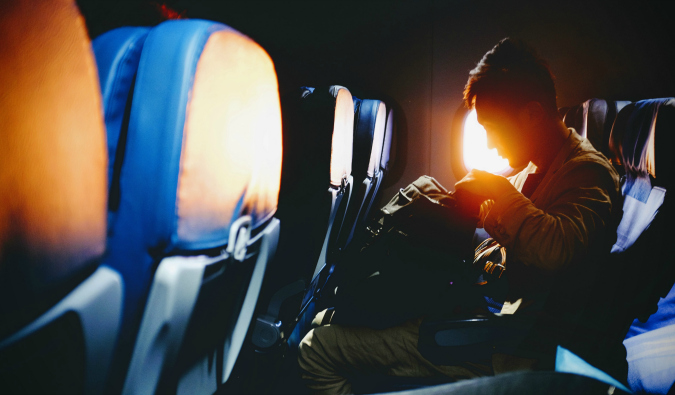
Most people aren’t born savvy travelers. It’s something that only comes with on-the-road experience. Travel savviness is a process born of missed buses, foolish behavior, cultural unawareness, and countless tiny errors. Then, one day, you begin to seamlessly move through airports and integrate yourself into new cultures like a fish to water.
In the beginning, you just make a lot of travel mistakes.
But I want to help speed up the process and help you avoid my mistakes ( and I often make a lot of them ), so I put together this giant list of my best travel tips that cover everything under the sun to help you reach your full travel ninja potential.
I’ve learned these tips over the last sixteen years being a nomad.
These tips for traveling will have you saving money, sleeping better, getting off the beaten path more, meeting locals, and just being a better traveler.
So, without further ado, here are the best 61 travel tips in the world:
1. Always pack a towel. It’s the key to successful galactic hitchhiking – and plain common sense. You never know when you will need it, whether it’s at the beach, on a picnic, or just to dry off after a shower. While many hostels offer towels, you never know if they will or not, and carrying a small towel won’t add that much weight to your bag.
Make sure it’s a lightweight, quick-drying towel since regular towels are too bulky and heavy (and they take a long time to dry). Dry Fox travel towels are my favorite (use the code “nomadicmatt” for 15% off your purchase)!
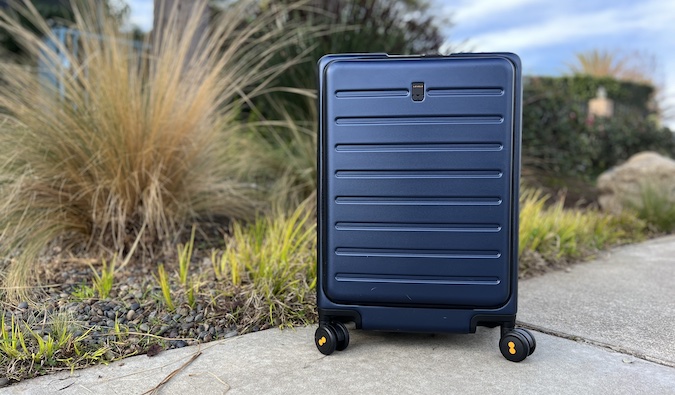
My favorite bag is the Flash Pack from REI . Other companies offering high-quality bags are Osprey, Nomatic, and MEC (for Canadians).
This article has more tips on finding the best travel backpack for your needs.
The same rule applies to suitcases. Don’t take a huge suitcase because they are a pain in the butt to lug around, especially if you’re traveling long term (short term, not so much). I like Level 8 suitcases. They are durable, quite spacious, nicely designed, and well-priced (luggage can be pretty damn expensive). Plus, they have a TSA lock built into the zipper. You can click here to learn more and buy one .
I also recommend packing cubes , which are essential if you’re going to be living out of a backpack for a few weeks (or months), or you just want to keep your suitcase better organized. They come in a variety of sizes, allowing you to store items big and small. They’re great for making it easy to find everything in your backpack or suitcase.
3. Pack light. Write down a list of essentials, cut it in half, and then only pack that! Plus, since you bought a small backpack like I said above, you won’t have much room for extra stuff anyways! Take half the clothes you think you will need…you won’t need as much as you think. It’s OK to wear the same t-shirt a few days in a row.
I love Unbound Merino , as their travel clothing can be worn daily for weeks without getting smelly. They are super light and they look sylish too. I really love the material, they’re comfortable, they hardly ever need a wash, and they last forever!
Click here for more packing tips .
4. But take extra socks. You’ll lose a bunch to laundry gremlins, wear and tear, and hiking so packing extra will come in handy. Take a few more than you need. Trust me on this. Nothing beats a fresh pair of socks!
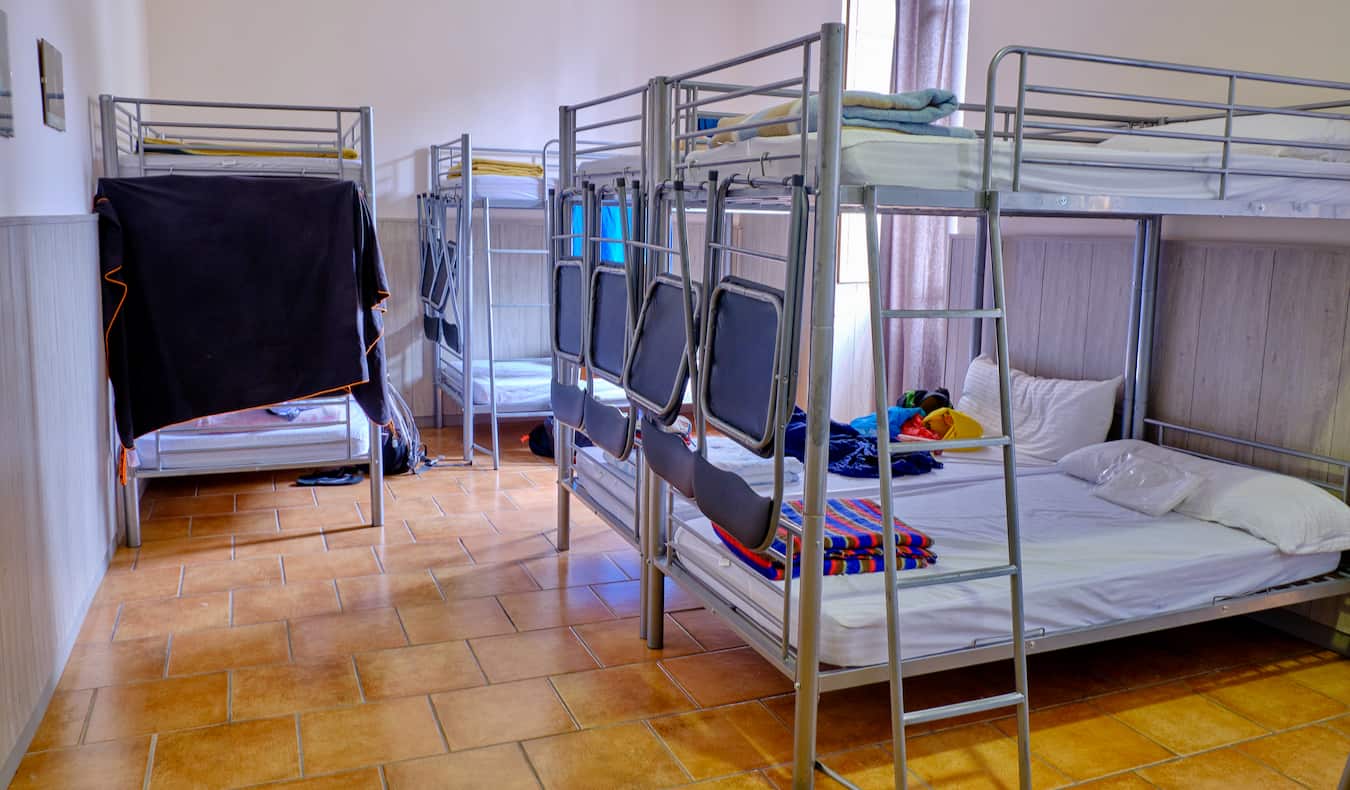
Here’s a list of all my best hostels around the world . If you’re planning on backpacking Europe , it’s worth getting HostelPass , a card that gives you up to 20% off hostels throughout Europe. It’s a great way to save money, and they’re constantly adding new hostels too. I’ve always wanted something like this and so I’m glad it finally exists. Use code NOMADICMATT for 25% off.
6. Take an extra bank card and credit card with you Disasters happen and things get stolen or compromised. I once had a card duplicated and a freeze put on it. I couldn’t use it for the rest of my trip. I was very happy I had a backup. You don’t want to be stuck somewhere new without access to your funds. This happened to a friend once and they had to borrow money for me for weeks while they waited for their new card to arrive.
Here are some helpful articles on banking:
- How to Avoid Banking Fees While Traveling
- 22 Ways to Cut Your Expenses and Have Money for Travel
- How to Pick the Best Travel Credit Card
7. Make sure to use no-fee bank cards. Don’t give banks your hard-earned money. Keep that for yourself and spend it on your travels. Get a credit card and debit card that doesn’t charge a foreign transaction fee or an ATM fee. Over the course of a long trip, the few dollars they take every time will really add up!
Here’s an article that will tell you how to do that.
8. Don’t fly direct. When booking flights, sometimes it is cheaper to fly in to airports close to your final destination, and then take a train, bus, or budget airline to where you need to go.
To use this method, find out how much it is to go directly to your destination. Then, look at prices to nearby airports. If the difference is more than $150 USD, I look to see how much it is to get from the second airport to my primary destination.
My favorite flight search engine is Skyscanner . This is my go-to website for finding cheap flights. It searches a lot of different airlines, including many of the budget carriers that larger sites miss.
Here are some more tips on finding cheap flights!
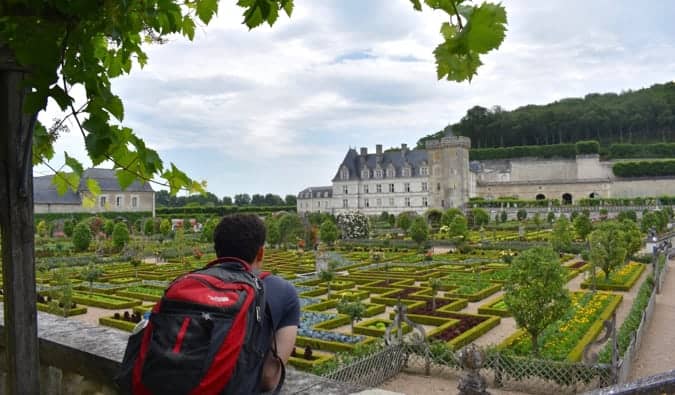
Here are some helpful articles on solo travel:
- Why I Travel Alone
- The Joy of Solo Travel
- Travel: The Ultimate Personal Development Tool
- How to Overcome Being Alone
- Reading People: One Skill Travel Has Taught Me
10. Always visit the local tourism information center. This is probably one of the most underused travel tips in the world. Tourism information centers know about everything going on in town. They can point you to free activities, special events happening during your stay, and everything in between. They even offer discounts on attractions and transportation. It is their job to help you experience the destination better. It’s amazing how many travelers skip this when they are visiting somewhere but, as a savvy traveler, you know to use this resource!
11. Take free walking tours. Besides being free, these tours will give you a good orientation and background of the city you are visiting. I love, love, love taking walking tours when I travel. You pass the time, you get to pepper the guide with questions, and you get to learn so much about where you are. Here are some of my favorite walking tour companies around the world:
- The Best Walking Tours in New York City
- The Best Walking Tours in London
- The Best Walking Tours in Paris
- The Best Walking Tours in Berlin
- The Best Walking Tours in Amsterdam
And while free walking tours are great, sometimes it’s worth it to take a paid walking tour if you’d like to dig deeper into a particular aspect of the destination. Walks is one of my favorite paid walking tour companies, offering in-depth history and cultural tours in cities around the world (especially Europe). Its small-group tours also tend to offer exclusive behind-the-scenes access you can’t get elsewhere.
For fellow foodies, Devour Food Tours has all kinds of amazing food tours around Europe.
12. Don’t be afraid to use a map. Looking like a tourist isn’t as bad as getting really lost and ending up in the wrong neighborhood. Don’t be afraid to use a map or ask for directions and look like a tourist. After all, you are one!
13. But don’t be afraid to get purposefully lost. Wandering aimlessly through a new city is a good way to get to know it, get off the beaten path, and away from the tourists. You might be surprised by the hidden gems you find. I like to wander around and try to find my way without using Google Maps. Travel is the art of discovery and you never know what cool little spot you’ll come across.
14. Ask hostel staff for information — even when you aren’t staying there. Hostel staff deal with budget travelers all day, every day. They know exactly where to go for cheap meals and attractions. They also tend to be locals so they know the city very well. Ask them for all sorts of information. Even if you aren’t staying in one, just pop in and ask for help. They’ll usually give it.
15. Sign up for flight deals. When it comes to travel, your flight(s) will likely be your biggest expense. Save money by signing up for flight deal websites. You’ll get epic flight deals straight to your inbox, saving you time and money. Also be sure to sign up for airline newsletters, since that is where they will announce their sales first. The best websites for finding travel deals are:
- Going (formerly Scott’s Cheap Flights) – The BEST for upcoming US flight deals.
- The Flight Deal – Great for global flight deals.
- Holiday Pirates – The best for European flight deals.
- Secret Flying – A great site for flight deals from around the world.
16. Don’t buy a money belt — they’re stupid. Thieves know they exist and being seen with one basically shouts, “Look at me, I’m a tourist with money! Rip me off!” The more you can blend in and act like a local, the easier it will be to get deals and avoid touts. If you’re worried about pickpockets, keep a better eye on your stuff!
17. When you go out, take only what you need. Limit the amount of cash and bank cards you carry with you when you go out, so if something does happen, you can easily recover. Never take more than one credit card or ATM card with you. My rule for cash is to limit what I carry to $50 USD.
18. Always carry a lock. Carry a small combination lock with you when you travel. They come in handy, especially when you stay in dorms. Most hostels use lockers, so budget travelers need to provide their own travel lock to keep stuff secured. While you can usually rent or buy them at hostels, it’s much cheaper just to buy one before you go. (Just don’t use one with keys because if you lose the keys, you’re screwed!)
19. Make extra copies of your passport and important documents. Don’t forget to e-mail a copy to yourself too. You never know when you might need to have some sort of documentation with you and might not want to carry your original. Additionally, if your passport gets stolen having a copy will come in handy for your police report.
20. Learn basic phrases in the native language of your destination. The locals will appreciate it and it will make your interactions easier. You don’t need to master the language but learning a few things like “Hello,” “Goodbye,” “Thank you!”, “Where’s the bathroom?” will go a long way to endearing yourself with the locals. They’ll like that you tried.
Here are some tips on how to learn a language .
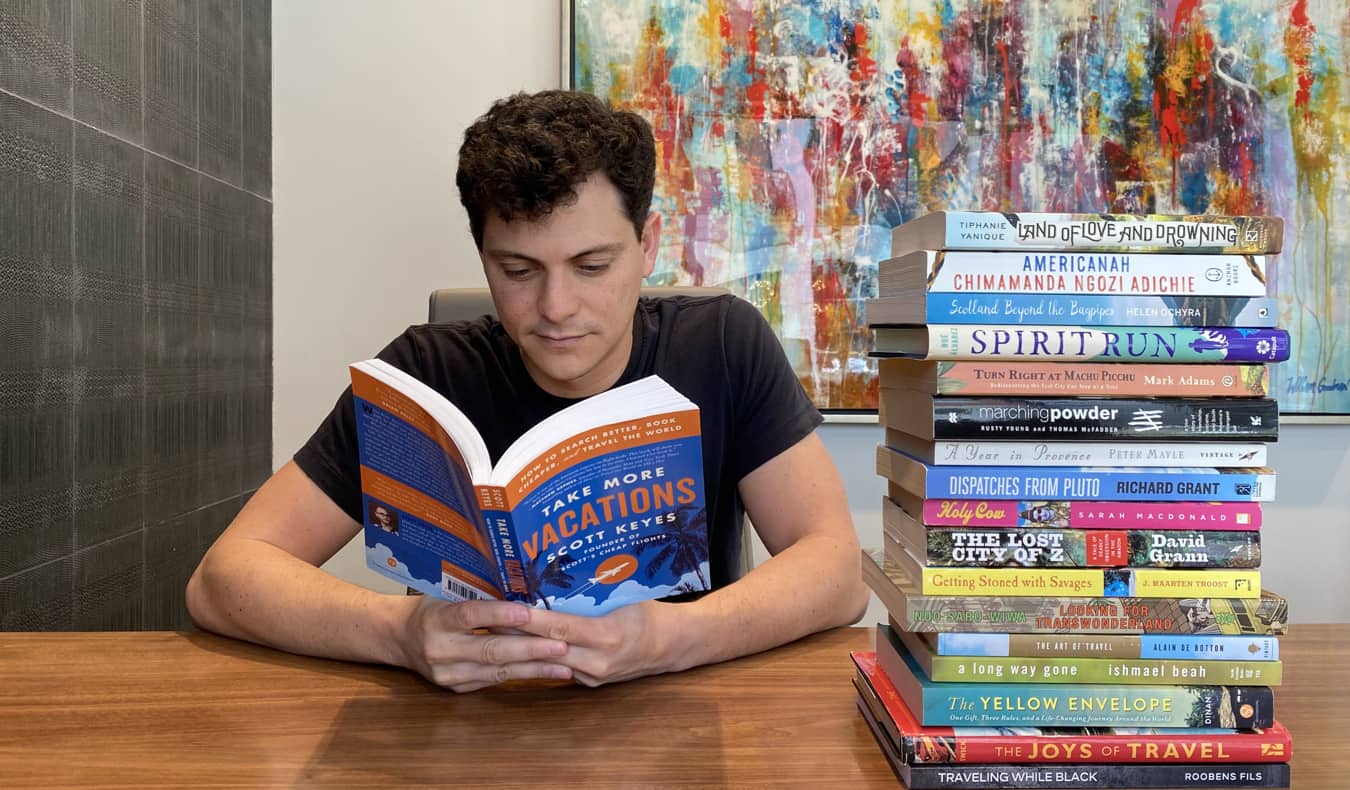
Here are some posts that highlight my favorite reads:
- 13 Travel Books That Will Give You Serious Wanderlust
- The Best Travel Books
- 12 Books to Take You Around the World
22. Don’t be ashamed to walk into a Starbucks or McDonald’s. Sometimes familiarity is comforting and both places have free wifi and public restrooms you can use. (Just don’t eat the food at McDonald’s! That shit is gross and unhealthy for you! You can get it back home!). Libraries and most modern coffee shops also have free Wi-Fi too.
23. Always get behind business travelers when in security lines. They move fast since they are usually in a rush and travel light. They know the drill. Line up behind them as much as possible. You’ll speed through the line!
24. Never get behind families in airport security. They take forever. It’s not their fault. They just have a lot of stuff because of the kids. Try to avoid getting in lines with lots of kids. It’s going to take a while.
25. When you check in to the hotel, don’t be afraid to ask for an upgrade. They have a lot of flexibility when it comes to assigning upgrades at check-in. It never hurts to ask. Often times they can accommodate you if the hotel isn’t full. Just be super nice!
Note: If you stay in hotels frequently (or want to), it might be worth it to get a hotel credit card . You can earn points on your everyday spending at home and convert those points into free stays. The best cards come with status, making upgrades more likely too!
26. Write down your experiences. Even in this hyper-technological age, I think everyone needs to write more during their travels so they have something to look back on. I never leave home without a journal. Not only do I use them for work (I’m constantly taking notes and writing down ideas) but I also use them to keep track of my travels.
Simple travel journals work great for journaling during your trip as well as for writing down logistical information like directions, contact information, and language tips.
If you want a travel journal that isn’t just blank pages but rather has space for itinerary planning, places to jot notes in the local language, inspirational quotes, and more, grab our new travel journal. It was designed specifically with travelers in mind, so you can take notes as well as write down stories and reflections during your travels.
27. Lunchtime is the best time to visit historical sites. Be a contrarian. You’ll have fewer crowds getting in your way as big tour buses, groups, and most travelers head to lunch. It’s always best to visit an attraction super early, late, or when people eat. You’ll have even the most popular places to yourself!
28. Never eat in a touristy area or near a tourist attraction. As a general rule, I walk five blocks in either direction before I find a place to eat. The closer you are to tourist attractions the more you are going to pay and the worse the food (and service). Use websites like Yelp , Google Maps , or Open Rice to find some delicious and popular restaurants around you.
Additionally, never eat anywhere the menu is in like 6 languages! That means the restaurant is just for tourists!
29. Locals don’t eat out every night and neither should you. Go grocery shopping. You can learn a lot about locals’ diets by seeing the type of food they buy. Plus, it will save you a lot of money. You won’t regret it. Cook your food, save money, and surprise yourself!
30. Eat at expensive restaurants during lunch. Most expensive restaurants offer lunch specials featuring the same food they would serve for dinner but for a fraction of the cost! That’s the best time to eat out when you travel.
I share more tips on how to eat cheaply around the world here.
31. Pack a headlamp. This is a handy tool for both backpackers and anyone looking to do any hiking or camping. If you’re going to be staying in a hostel, having a headlamp is helpful when you need to check in or out but don’t want to disturb your fellow travelers by turning on the lights. They’re also helpful in emergencies.
32. Carry a basic first-aid kit. Accidents happen, so be prepared. I always take band-aids, antibacterial cream, and ointments for minor cuts and scrapes. You never know when you’re going to need it and you can’t always get it when you travel.
You can either assemble a first aid kit yourself ( here are some tips for doing so ), or purchase a pre-made kit online .
33. Don’t believe the cheap flight myths. Don’t drive yourself too crazy trying to get the absolute cheapest fare. There are a lot of myths online about how to find cheap flights, but there is no magic bullet or one secret ninja trick. It’s not cheaper to book on a particular day of the week, or if you search in an incognito window.
Spending five hours to try to save $10 will cause you a lot of stress. Once you find a flight deal that you’re happy with, book right away, as airfares change by the minute. Remember, you usually have a 24-hour window to cancel in case you need to.
Here are some article on how to save money on flights:
- 5 Steps to Booking a Cheap Flight Online
- How to Always Find a Cheap Flight
- Where I Find the Best Travel Deals
34. Use Meetup, the sharing economy, and hospitality websites to meet locals. These websites will help you get an insider’s perspective on your destination by connecting you with locals in the places you visit. The sharing economy has changed the way people travel allowing you to meet locals, get off the tourist travel, and save mega money! It’s a triple win – and I use these resources all the time when I travel.
Here’s an article on how to use the sharing economy (and what websites to use) when you travel.
35. Be open to strangers. Not everyone bites. Say hi to people on the road. Turn strangers into friends. Remember they are just like you! They want to live a happy, full life and have hopes and dreams too! You never know. You just might make some lifelong friends.
36. But keep your guard up. Some people do bite, so keep a healthy level of suspicion. You don’t want to fall for any travel scams or get yourself into uncomfortable situations. Be open but cautious. Here is a list of travel scams to avoid.
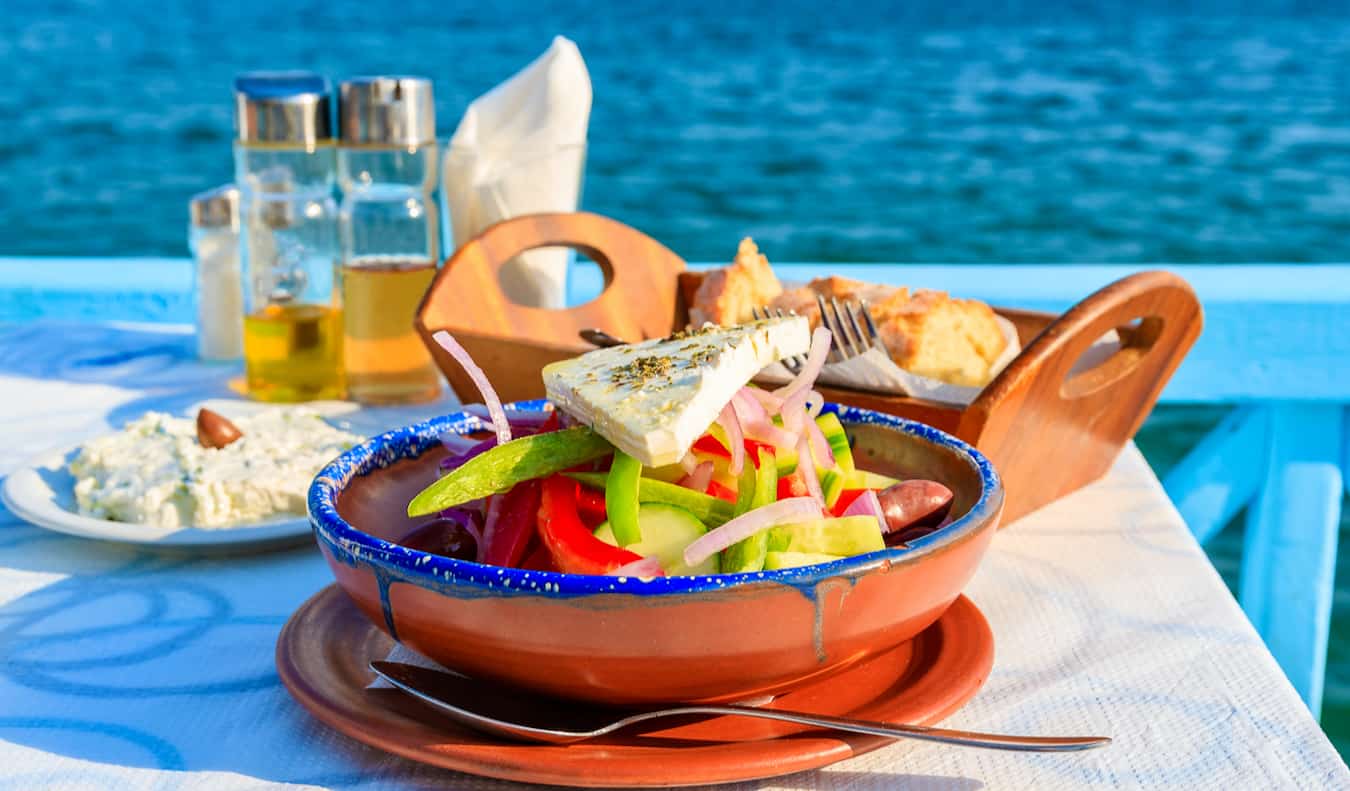
- My Favorite Restaurants in Europe
- The Best Places to Eat in NYC
- How to Eat Cheap Around the World
- 30+ Places to Eat in Tokyo
- How to Eat Around the World on a Vegan Diet
38. Avoid taxis. They are always a budget buster. Never, ever take a taxi unless you absolutely have too!
39. Take a reusable water bottle through airport security and fill it up at your gate. Single-use plastics are common in a lot of countries around the world. They’re also polluting our oceans and destroying the environment. Drink from the tap when you can — you’ll save money and help the environment. If you’re going somewhere where you can’t drink the water, be sure to get a water bottle with a filter. I love Lifestraw .
40. Get city attraction cards. If you are going to visit a lot of museums and other attractions in a short period of time, a city pass is going to save you money on admission (plus most provide free public transportation too!).
41. Take pictures of your luggage and clothes. If your bag gets lost, this will help identify it more easily and speed up the process of having your travel insurance reimburse you.
42. Carry emergency cash. Because emergencies happen, like that time in Romania when I couldn’t find an ATM and needed money for the bus to the hostel. I usually try to keep around $200 USD in emergency cash in case something happens!
43. Get good shoes. You walk a lot when you travel. Don’t beat up your feet. Love them as much as they love you, and they’ll take you to amazing places.
My favorite shoes for traveling are Suavs shoes , which are versatile and durable. They’re comfortable and great for exploring a new city all day, but also look nice enough that you can dress them up if you want to at night.
44. Get vaccinated. Because falling prey to an illness in a foreign country is not fun — and many countries require you to get vaccinated in order to visit them. So regardless of your opinion on the subject, you just might have to.
Here is an article on how to stay healthy on the road.
45. Learn to haggle. Haggling is a fun, playful way of not getting charged the foreigner price. It’s the art of negotiating and one that will help you throughout all of life, not just at the market.
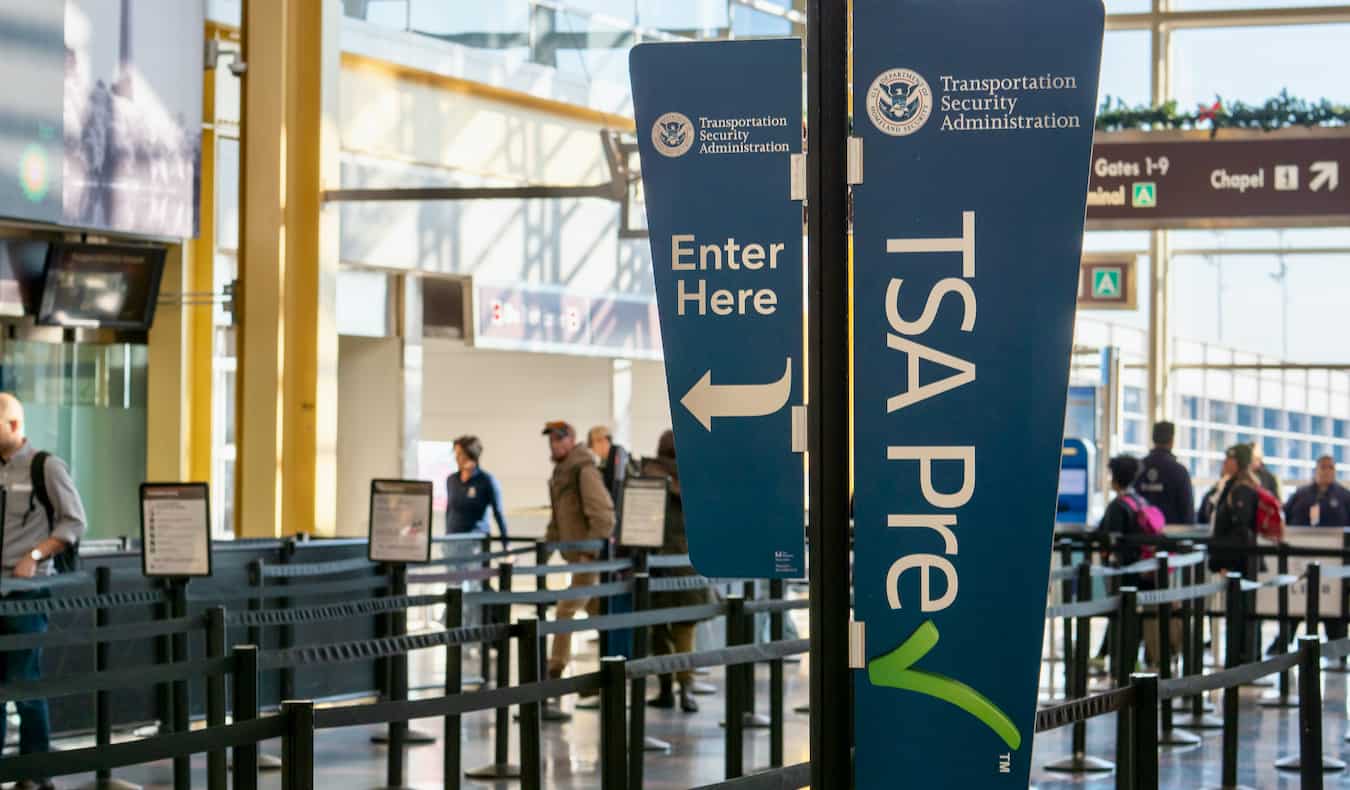
Here are some articles to help you get started with using points and miles:
- Points and Miles 101: A Beginner’s Guide
- How I Earn 1 Million Frequent Flier Miles Every Year
- The Best Travel Credit Cards
- The Ultimate Guide to Picking the Best Travel Credit Card
47. Take a jacket. Nights get chilly.
48. Eat street food! If you skip the street food, you miss out on culture . Don’t be scared. If you’re nervous, look for places where kids are eating. If it’s safe for them, it’s safe for you.
49. Get travel insurance. Travel insurance is the most important thing to get that you never want to use. If something goes wrong, you don’t want to be out thousands of dollars in bills. Travel insurance will be there if you get robbed, flights get canceled, you get sick or injured, or have to be sent home. It’s comprehensive and, for just a few dollars a day, one of the best investments you can get for a trip.
You may think you’re superman/woman but so did my friend who broke her arm, didn’t have insurance, and had to pay thousands out of pocket. Insurance was there when I had to replace my camera and when I popped an eardrum scuba diving! Get it! Here are some tips on how to find the best travel insurance.
My favorite companies are:
- SafetyWing – A budget-friendly choice for travelers who need basic coverage. They are affordable, have great customer service, and make it easy to make a claim. If you’re on a tight budget, go with SafetyWing!
- Insure My Trip – The best insurance for those over 70 years old.
- Medjet – This is a membership program that provides emergency evacuation coverage should you get into a dire situation while traveling and be hospitalized. Medjet is meant to supplement your regular travel insurance.
50. Be patient. Things will work out in the end. No need to rush. You’ll get to where you are going in due time. Travel is about the journey, not the destination.
51. Be respectful. Locals are willing to help you out, but there’s probably a language barrier, so keep your cool when something doesn’t go your way. If you don’t, you’ll end up just looking like an asshole tourist.
52. Don’t over plan your trip. Let your days unfold naturally. Schedule two or three things and let the day fill in the rest on its own. It’s less stressful, and letting the day just take you is one of the best ways to travel. Here’s my advice on how not to over plan your travels!
53. Relax. See Be patient .
54. Be frugal — but not cheap. Don’t be pennywise but pound-foolish. Look for deals and don’t waste money, but don’t miss out on great experiences or walk 10 miles to save a couple of dollars. Time is money. Spend them both wisely.
55. Take earplugs. Anyone who has ever stayed in a hostel knows that earplugs are a necessity. Snorers are everywhere and you need your sleep.
But even if you’re not going to be in a hostel, they’re still helpful for sleeping well if your accommodation is located on a busy street, or for sleeping in buses, overnight trains, and other types of transportation. A good night’s sleep is priceless — be prepared!
These earplugs are reusable and work much better than the cheap foam ones, blocking out any distracting noises.
56. Always carry a power bank. Batteries die. Your good mood shouldn’t.
We all travel with numerous electronic devices like phones and tablets, but it can be hard to keep them all charged. An external battery solves that problem.
57. Remember that you’re not alone even if you’re traveling solo. Traveling alone never means you’re really alone. Wherever you go, there is a network of travelers who will be your friends, give you advice or tips, and help you out. They will guide you, point you in the right direction, and be your mentors. You aren’t out there on your own. You’ll make lots of friends and tons of memories.
If you’re not sure about traveling on your own for the first time, you can always join a group tour, such as those we offer at The Nomadic Network . I’ve designed all the itineraries myself to ensure they cover the highlights, get you off the tourist trail, and connect you with friends and locals.
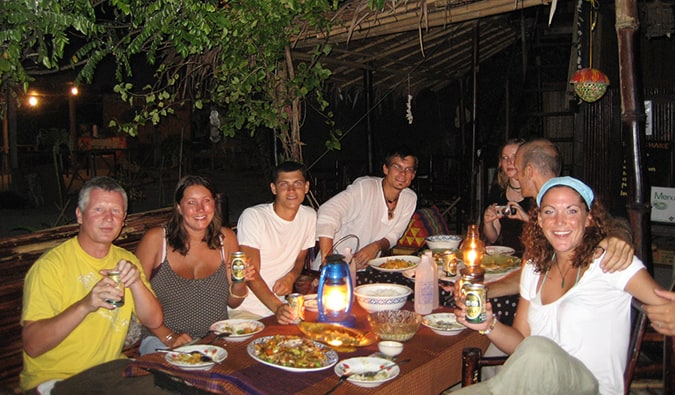
59. Pre-book your tickets to attractions, activities, and excursions online. If you’re planning to do any activities or excursions on your trip, book them online. Companies usually offer a discounted price when compared to buying in person. Not only that but you’ll be able to pay with a credit card, giving you some extra protection as well as more travel points!
Many major attractions also allow you to reserve your spot and skip the line. Always look online to see if this is an option. This will you to avoid wasting time in multi-hour lines and go right in. I’ve seen people wait hours for the Paris Catacombs, Louvre, London Churchill War Rooms, churches, temples, historic fortresses, and more. Pre-book the day before, skip the line, get to see more during your day!
Get Your Guide is my favorite place to book activities in advance. It’s a huge online marketplace for tours and excursions, with tons of options in cities all around the world, including skip-the-line attraction tickets, cooking classes, walking tours, and more!
60. Avoid TripAdvisor. TripAdvisor is fine when you need opening hours or an address, but when it comes to reviews I ignore it completely. People always leave a negative review when something bad happens but rarely leave a positive review when something good happens so the reviews tend to be skewed.
On top of that, it’s very easy to create fake reviews and make a place seem better than it is. Many hotels and restaurants hire firms to artificially inflate their reviews on the platform. Additionally, TripAdvisor has been known to take down reviews that are overly negative as well as reviews on sexual assault. Use TripAdvisor with caution. Or better yet, don’t use it at all.
61. Finally, wear sunscreen. For as the Baz Luhrmann song “Everybody’s Free (To Wear Sunscreen)” goes:
If I could offer you only one tip for the future, sunscreen would be it. The long-term benefits of sunscreen have been proved by scientists Whereas the rest of my advice has no basis more reliable Than my own meandering experience.
Book Your Trip: Logistical Tips and Tricks
Book Your Flight Find a cheap flight by using Skyscanner . It’s my favorite search engine because it searches websites and airlines around the globe so you always know no stone is being left unturned.
Book Your Accommodation You can book your hostel with Hostelworld . If you want to stay somewhere other than a hostel, use Booking.com as it consistently returns the cheapest rates for guesthouses and hotels.
Don’t Forget Travel Insurance Travel insurance will protect you against illness, injury, theft, and cancellations. It’s comprehensive protection in case anything goes wrong. I never go on a trip without it as I’ve had to use it many times in the past. My favorite companies that offer the best service and value are:
- SafetyWing (best for everyone)
- Insure My Trip (for those 70 and over)
- Medjet (for additional evacuation coverage)
Want to Travel for Free? Travel credit cards allow you to earn points that can be redeemed for free flights and accommodation — all without any extra spending. Check out my guide to picking the right card and my current favorites to get started and see the latest best deals.
Need Help Finding Activities for Your Trip? Get Your Guide is a huge online marketplace where you can find cool walking tours, fun excursions, skip-the-line tickets, private guides, and more.
Ready to Book Your Trip? Check out my resource page for the best companies to use when you travel. I list all the ones I use when I travel. They are the best in class and you can’t go wrong using them on your trip.
Got a comment on this article? Join the conversation on Facebook , Instagram , or Twitter and share your thoughts!
Disclosure: Please note that some of the links above may be affiliate links, and at no additional cost to you, I earn a commission if you make a purchase. I recommend only products and companies I use and the income goes to keeping the site community supported and ad free.
Related Posts
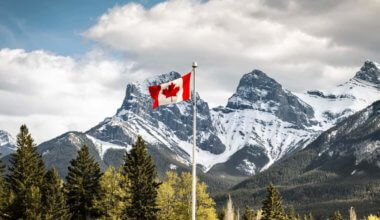
Get my best stuff sent straight to you!
Pin it on pinterest.

10 Lessons That Travel Has Taught Me
Written By: Renuka Walter
Inspiration
Updated On: November 16, 2022
I have always believed that travel teaches you without a scorecard. It enriches you gently. When you step out to see the world – meet people, get acquainted with different cultures, taste new cuisines or simply breathe in an unfamiliar city – you learn a lot!
Learning through travel happens naturally – you don’t have to try too hard. It’s all about losing yourself into the arms of a new environment.
You have to first shrug off the ‘safe’ and ‘tried and tested’ syndrome and delve into the unexplored with a free spirit.
Table of Contents
Lessons Travel Taught Me
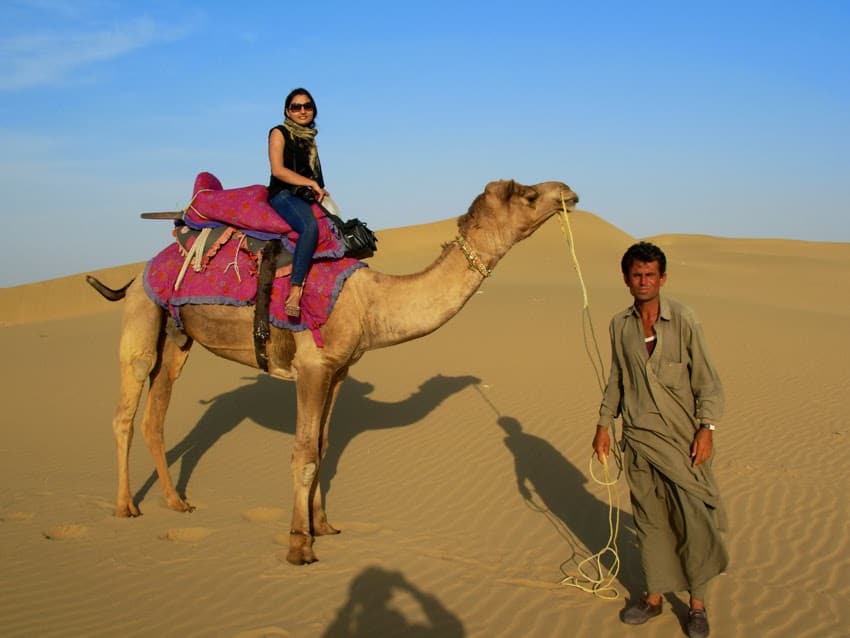
Travel has taught me a lot.
It has taught me so much that I am even keener to learn more through it. Let me share 10 things that I have learned from my travels so far.
Value little things
Travel has opened my eyes to small, ordinary things of life- things that are undervalued, but have great significance.
Now I am more conscious towards waiters, chauffeurs, florists, vendors and any random person whom I come across on my vacations.
I have a deeper sense of respect for them, because they are the ones who make our travels smooth for us.
I often make it a point to interact with people, and that makes my travel experience even more rewarding.
Travel Broadened my perspective
Now I have a much better perspective of life. I have come out of my shell where all I knew was my family, my relationships, my job, my struggles and my life.
Travel has opened new doors for me – I can see different aspects of life.
I can understand what is important and what can be sidelined. It has helped me think beyond the traditional mindset that there is more to life than the usual.
Travel helped me open up
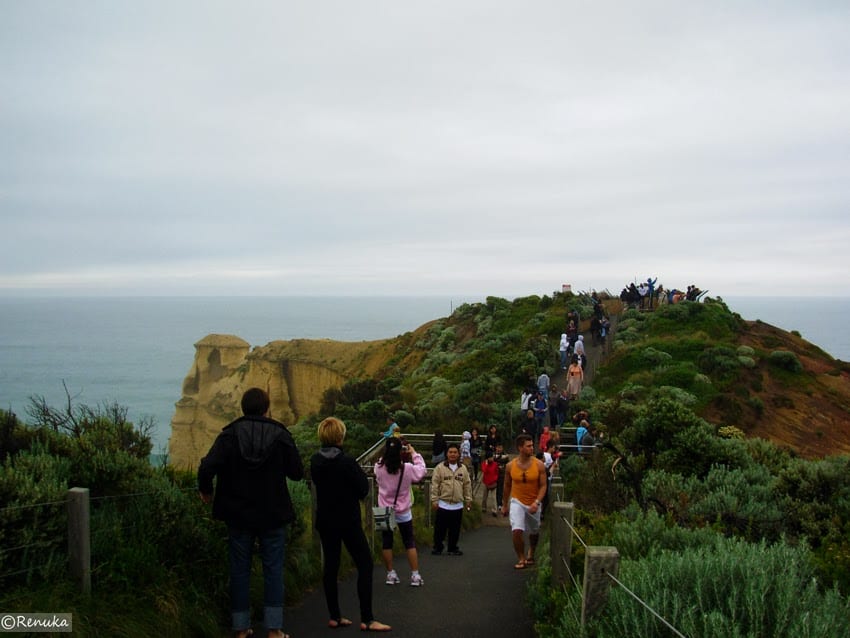
I have learned to interact with people.
I am an introvert – I don’t speak much when I am around people I don’t know. But now because of travel I have started interacting with people on my travels.
I am not saying that I instantly become friends anybody and everybody, but I do initiate conversations with random fellow travelers.
I believe if you don’t interact with your fellow travelers and the locals of your destination, you barely experience a place.
Travel Boosted my confidence
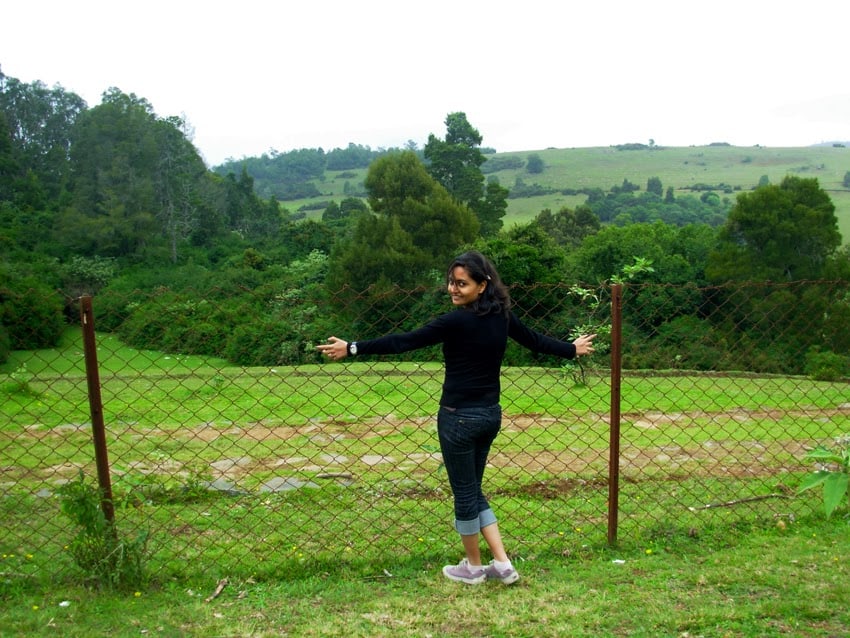
I have always been as confident or as nervous as any other person, but travelling has instilled a new level of confidence in me.
I am certainly more confident of myself as a person today than I ever was.
When you travel, you have to manage so many things on your own – from booking accommodation to deciding where to eat and lots of other things that you do independently.
At the end of the day, there is a sense of achievement that you have explored a destination on your own and that’s a big deal!
I know my priorities in life – I’m more confident of myself now.
Travel Gave Me Purpose
Ever since I have started travelling, I know my priorities very well. I
know that I want to travel as much as possible. I know what I have to save for, what makes me happy and what I have to seek in life.
When I was not travelling, life was a usual rat-race and my priorities were work and money.
I didn’t know where I was going. I was clueless about my own ambition in life.
Travel has given me a clear direction and purpose.
Travel Made Me Less-Selfish
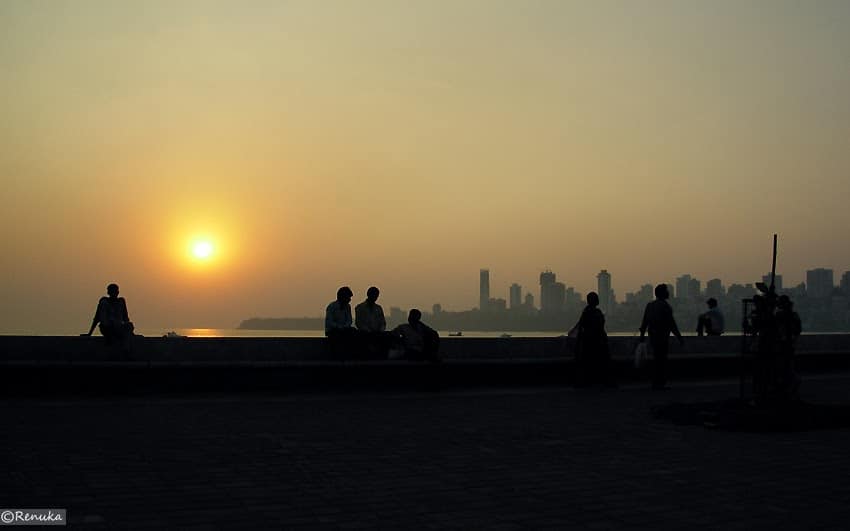
It may sound funny, but travel has helped me shed my selfish side.
I have always considered myself a sel- centered person. But travel has nudged me to look around and see life.
Now I am able to view life in all its hues.
I am able to relate to all kinds of people. I can think beyond my own challenges and realize the adversities faced by others. I’m able to look at others with compassion – everybody has challenges to deal with.
Travel Has Given me variety
Travel has introduced me to try new things and to be open to new cultures, people, food, architecture, landscape and so much more.
I have learned to appreciate the variety that life offers.
We don’t understand it till the time we begin to travel.
Now I wonder how some people get bored in their lives, when life has such wonderful things to enjoy. We just need to step out of our homes and discover the immense beauty out there.
Travel Sparked my Creativity
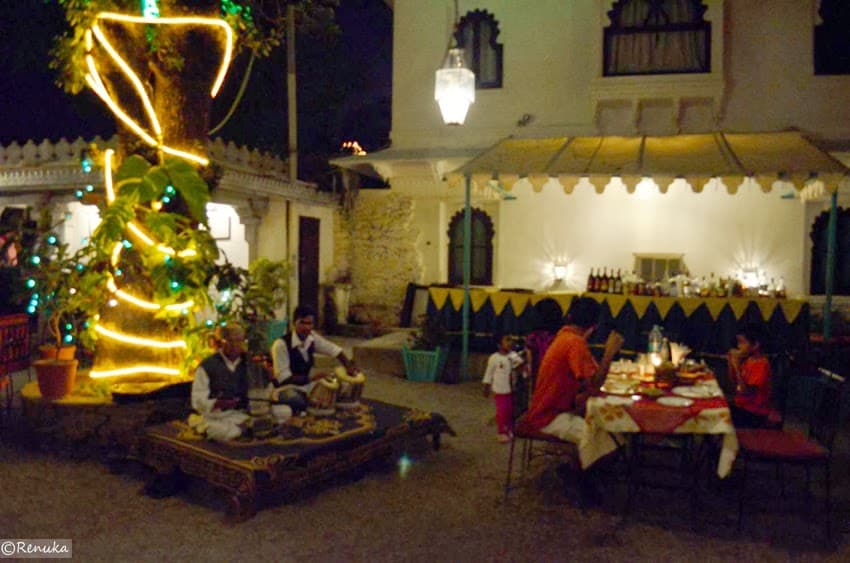
Through travel I am a more creative as a person.
By creativity, I don’t mean that I have learned a new skill. I simply mean that I have become more creative in my day-to-day living.
Travel opens our minds so much that we begin to see something interesting in everything – it could be something as simple as preparing a meal or arranging books on the shelf.
Travel Made Me More Grateful
It’s human nature to grumble about things.
But when we travel, we are able to negate such things with ease. I have realized that I have developed an attitude of gratitude.
I am more excited and thankful about life than I ever was because of my travels.
Made me more knowledgeable
Ever since I have started travelling and mainly started writing about my experiences, I have also been able to improve my world-wide knowledge.
As they say, travel is the best education.
Now I read a lot about destinations, different cultures, traditions, cuisines and other things. I look forward to learning about new things.
Now I find myself more equipped with knowledge, which has eventually made me a wiser person.
So that was my ode to travel. But that’s not all – I am sure there is much more that I must have learnt! And I will continue to learn throughout my life.
How has travel changed you?
- 10 Things You Need to Know Before Living in a Campervan
- How to be a Travel Blogger – From Dream to Reality and How We Make Money
- How Travel Changed our Lives and Turned Us into Adventurers
- 44 Best Gifts for Travelers
Travel Planning Resources
Looking to book your next trip? Why not use these resources that are tried and tested by yours truly.
Flights: Start planning your trip by finding the best flight deals on Skyscanner
Book your Hotel: Find the best prices on hotels with these two providers. If you are located in Europe use Booking.com and if you are anywhere else use TripAdvisor
Find Apartment Rentals: You will find the cheapest prices on apartment rentals with VRBO .
Travel Insurance: Don't leave home without it. Here is what we recommend:
- Allianz - Occasional Travelers.
- Medjet - Global air medical transport and travel security.
Need more help planning your trip? Make sure to check out our Resources Page where we highlight all the great companies that we trust when we are traveling.
You May Also Like
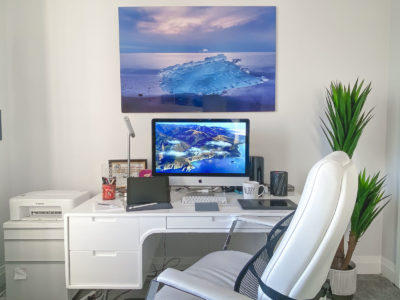
36 Awesome Gifts for People who Work From Home
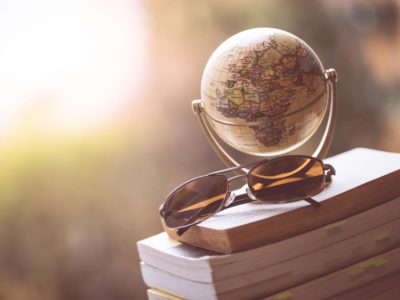
13 Best Adventure Travel Books to Inspire Wanderlust
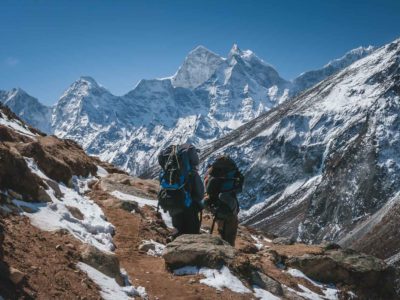
33 of the Best Gifts for Outdoor Lovers and Adventurers
About Renuka Walter
Renuka is a writer/photographer and a travel blogger from India. Through her blog, she aims to inspire and awaken people to travel. She has been a native in four different cities in India and would not mind more city-hopping in the future. When she is not travelling, she likes to be a tourist in her own city. Follow Renuka at VoyagerForLife / Facebook / Pinterest
Join thousands of others who get our monthly updates!
Leave a comment cancel reply.
Save my name, email, and website in this browser for the next time I comment.
29 thoughts on “10 Lessons That Travel Has Taught Me”
Nice travel blog..
What a brilliant read. Thanks for sharing this. I loved when you said complain less and be thankful. A lot of people just forget to be thankful 🙂
I also wrote about what travel has taught me and how it is taking my life story ahead. Do read my article and let me know if you like it 🙂
Great post – travelling teach us so many things. Confidence, open-mindedness, knowledge and much much more. I think you nailed it 🙂
We also wrote about our experiences from 2016 on our blog – a kind of status on the year. http://freerangetravellers.com/the-9-most-important-realisation-from-my-travels-in-2016/
That’s very well put, Jaryd! Travel actually reveals the beauty of life, which we fail to discover in our safe and routine lives.
I find the greatest thing I have learnt from travelling is wisdom and comprehension of cultures around the globe . What I mean by this is that travel teaches you unique things you can’t learn unless you travel from everything you see, smell, feel and comprehend. You learn more than you honestly imagine and it definitely makes you a lot wiser than what you would be if you were to stay at home stuck in a 9-5 bubble that doesn’t allow you to explore and gallivant.
Great post. Travel has helped me with all of these lessons as well. The big one for me is overcoming my introversion – still working on learning how to talk to strangers. I sure have grown over the past year of traveling.
Good for your Laura, you are right, travel definitely pushes you to be an extrovert. It can be difficult to talk to people, especially when you are an introvert, but it you have a lot more fun and experience more when you are open to talking to people. Congratulations!
That’s wonderful to know, Laura! Travel really helps us to rediscover ourselves.
Glad travel has brought so much growth in your life, rock on!
Thanks Steven 🙂 The journey of growth has just begun… the learning is everlasting!
Love it! Rock on is such a positive saying. It put a smile on my face. Thanks!
Great post! For me, the most important thing I have learned from traveling was “coming out of my shell”, stop being shy and start getting “more social”.
That’s so true, Natalia! Travel helps you rediscover yourself – even I was shy and reserved, but travel has made me a lot friendlier.
Wonderful Natalia! It sounds like travel has done amazing things for you too!
I think they should do away with self help books and people should simply travel. It always seems like this is the best way to grow and mature as a person. I think staying in the same place allows people to get bogged down with unnecessary worries. Seeking some sort of drama and excitement where otherwise life would be too static or dull.
I’m starting my travels in September and they couldn’t come soon enough. I look forward to writing a post like this myself. You are an inspiration.
Thanks! That’s nice to know, Kate! Travel helps us find the true meaning of life. It makes our life more worthwhile! People who don’t travel keep themselves from experiencing, learning and growing.
We agree, travel certainly helps people learn and grow. It’s one of the best ways to educate yourself while having fun!
Well said. Before we travelled, we read a lot of self help books. It wasn’t until we purged our lives from all the unnecessary expenses like two cars, big house, lots of bills and finally pursuing our dreams that we felt fulfilled. I spent years reading about how to improve my life, but travel is what finally helped me live a happier more fulfilling life.
Totally agree, Dave and Deb! Travel is one thing that squeezes out all the pain out of your life – the unnecessary desires, greed, anxiety, competition – everything fades away when travel is your priority.
Travel has taught me I’m a much more flexible person than I thought I was. Also someone recently described me as “adventurous” and I’d never thought of myself that way at all. However, I guess to people who don’t travel I am adventurous.
That’s so nice, Lisa 🙂 True, travel helps you rediscover yourself. Now you know that you are adventurous – because you enjoy stepping out of your comfort zone.
You are so right. People who travel and try new things don’t necessarily feel adventurous, but to others we are. It takes a lot of courage to try something new and to travel on your own. We feel that travel makes everyone more adventurous. It’s wonderful
You said “I often make it a point to interact with such small people” , why they are small ? Because of the job they are doing for living ? Or they are not tall enough ? Maybe should be re-worded a bit, people can understood it differently (like I did)
I didn’t catch that word in my editing Anja. Thanks for pointing that out. I believe that it may be a language barrier on Renuka’s part. After re-reading it I don’t think that she meant to offend, but instead didn’t use the right wording. Hopefully Renuka will reply with what she meant. I took out the word ‘small’ as I would never describe an occupation that way. Dave and I are former waiters, and I chauffeured many a person around when I was a production assistant in the film industry. All people in life are important, never small. Thanks again for your comment.
Thanks Anja for your comment. 🙂 Yes, I totally agree that no occupation is small. However, things in India are a little different. Here people are considered small. My intention for writing ‘small’ was not small, but to highlight the importance of such people who help us during our travels – waiters, drivers and the like. I’m sorry if it didn’t sound good. I have deep respect for everybody.
Well said Renuka. We did notice quite a difference in culture while visiting India and it is wonderful that travel has helped you see the importance in everyone. We think travel breaks down boundaries in all aspects of life.
I agree with all of it! I certainly think that mingling is key to getting the most from travel – and that you should try harder to mingle with locals than with fellow travellers, although you will learn so much from both.
That’s true Arianwen. 🙂 Mingling with locals is certainly more rewarding. It gives you an interesting perspective about the place.
Well said Arianwen, mingling with everyone is a good thing. We’ve got some of our best tips and made some of our greatest friends from meeting fellow travelers as well as the locals.
Online Courses to Brush Up Your Wine and Dance Skills Before Traveling
By Mary Olivia Keith

All products featured on Condé Nast Traveler are independently selected by our editors. However, when you buy something through our retail links, we may earn an affiliate commission.
Since the coronavirus pandemic began derailing travel plans, we’ve been spending more time finding ways to satisfy our curiosity from home . Every day, it seems like there are more livestreams and videos available that let you experience new places without leaving your couch, from museum exhibits to wildlife webcams . For those looking for something a little more interactive, we’ve compiled a list of classes to help you hone your language and dance skills, brush up on historical facts, or enjoy the food and beverages waiting for you on your next adventure, whether you’re mentally planning a trip to Madrid, Tokyo, or Buenos Aires. Below, the best online courses to try out during quarantine, divvied up by category.
All products featured in this story are independently selected by our editors. However, when you buy something through our retail links, we may earn an affiliate commission.
Learn the language
Driving through any country is a lot more fun when you can actually read the signs. (You'd be pretty irked to miss the turn for a hot spring in Iceland because you didn’t know what hverir meant.) While you’re dreaming of your next vacation, take some time to learn a bit of the language . DuoLingo is a free app and great for beginners trying to learn basic vocabulary, though it doesn’t give the freedom for personalization to learn about specific topics. If you’re looking for more, Rosetta Stone ($200 for unlimited lifetime access) provides personalized plans and live coaching. And if you want something tailored to vacations, Living Language has language courses specifically for travel. Their passport courses ($50) give you three months to learn language basics, as well as history, culture, and traditions of a specific country.
.jpg)
Study Greek Architecture on Udemy so you can point out the Temple of Poseidon on your next vacation.
Brush up on your historical and cultural knowledge
For history or art buffs planning a trip to a new city, chances are at least a few museums and famous landmarks will be part of your itinerary. In order to fully appreciate what you'll see, refresh your memory on the country’s history first. There are basic history courses, like Coursera’s free Russian History: From Lenin to Putin class, hosted by U.C. Santa Cruz. Then there are more specific classes tailored to niche interests. Harvard hosts free culture courses, like Japanese Books: From Manuscript to Print , which details historical writing formats and storytelling properties. Udemy runs introductory classes, like Egyptian Art ($165), which goes through different time periods and styles of art in Ancient Egypt. Architecture, an often overlooked topic, is influential to a country’s cultural history; Udemy offers multiple courses on architectural history with varying depth, including Essentials of Byzantine Architecture ($25) and Greek Architecture ($195).
Deepen your appreciation for food
If you’re craving cuisine from a specific city or region, now is the time to try and recreate it at home. While some of our favorite chefs have been sharing tutorials on social media , there are more structured options, too. Learn the Art of Sushi Making ($200) from Udemy gives lifetime access to resources, on-demand videos, and completion certificates with step-by-step virtual instruction. If you’re looking for instruction from the best of the best, look no further than MasterClass’s culinary section. Dominique Ansel , celebrated pastry chef and creator of the cronut, teaches French Pastry Fundamentals ($180). There are 17 pre-recorded lessons, each building on the last. Massimo Bottura offers a 14-part modern Italian cooking class ($180) on MasterClass, too. Other courses provide even more engagement: The Chef and the Dish hosts private Skype sessions with global chefs to learn specialized recipes like seafood paella ($300). The class goes through making paella and a side salad in two hours, and the one-on-one time with a professional chef allows you to ask questions while you learn.

Earn a wine certificate through the Napa Valley Wine Academy.
Become an alcohol aficionado
Like food, beverages are an important part of any country’s culture. Rather than rely on bartenders’ recommendations (though that is a good way to use your new language skills), use this time to get to know your own tastes. Skill Share ($100 a year, or $20 per month) has a wide range of online courses, including one on Belgian Beer . Not only does the class go through Belgium’s beer culture, it helps you learn to differentiate styles and understand the production process. Napa Valley Wine Academy’s course, Discovering Italian Wine ($125), provides maps to discover the regions where certain grapes grow, and exercises and exams, which, if completed, earn you a wine certificate. If you’re eager to head south to Mexico City or Jalisco , consider expanding your tequila knowledge first. Tequila: Origins, Standards, Styles, Flavors ($10) from Beverage Edu is extensive for its price and covers tequila’s history, drink and food pairings, and production methods and locations.
Dance like a pro
If you’ve always wanted to tango in Argentina or salsa dance through Colombia , consider learning a few steps before you visit. Coursera offers a free class from Emory University, called “ So You Think You Know Tango? ” There are two modules: the first focuses on the Argentinian dance’s history and development, and the second teaches basic movements. Other courses focus more on dancing, less on history. Learn How To Dance Bachata ($50) from Udemy has 25 short tutorials, so you can follow the instructor over and over until you get it right. This class focuses on the basics, and won’t get too advanced by the end. For people looking for mastery, try the Salsa Bootcamp ($67) from My Salsa Online. It starts with the fundamentals, but progresses into more complicated steps and patterns quickly, so you’ll be dancing like a pro in no time.
By signing up you agree to our User Agreement (including the class action waiver and arbitration provisions ), our Privacy Policy & Cookie Statement and to receive marketing and account-related emails from Traveller. You can unsubscribe at any time. This site is protected by reCAPTCHA and the Google Privacy Policy and Terms of Service apply.
7 Vacations That Will Make You Smarter
Sip wine or learn to drive a race car on vacations that double as classwork
Imagine sipping wine in Tuscany with a winemaker, photographing animals in Africa with a professional photographer, or digging for folsom points with archeologists in the Southwest United States. They're all perfect excuses for vacations. Call them EdVentures if you will—these educational vacations combine your favorite activities, allowing you to experience different cultures and learn new skills, while feeding your endless curiosity about the world around you. Here are some great options that can help you do just that.
Learn Spanish in Ibiza
Learn Spanish in Ibiza; try your hand at sailing in Queensland, Australia; or create jewelry as a silversmith in the South of France—those are just a few of the trips GoLearnTo offers. The educational tour company themes all of its trips around locally significant skills, languages, or adventure sports. From learning to cook to honing your yoga skills, you'll find options in the GoLearnTo catalog that will entice you to embark on a learning experience. They even offer specific options for single travelers who don't want to be left out of the fun.
Study Literature Locales Around the Globe
You'll have to do your homework for Classical Pursuits tours—literally. The Toronto-based tour company provides a recommended reading list to its members before each of its trips, which extensively explore famous literary destinations. For instance, the company can take avid travelers and readers to along the road less traveled through Portugal or to Philadelphia to discover learn about the birth of a nation. The itineraries on offer change regularly, but each is an intriguing look into culture, art, and literature that is simply unlike any other trip you'll ever take.
Dig for Ruins in Colorado
At the Crow Canyon Archaeological Center you can work alongside professional archaeologists studying the Ancestral Puebloans (at one time called the Anasazi) and how they lived in the cliff-side dwelling and rugged canyons in southwestern Colorado. There are programs designed for novices, as well as alumni of previous programs and for families too. The Archaeological Center even organizes trips to other parts of the U.S. and abroad to foster an interest in history, culture, and religion. For instance, the organization regularly sends travelers to Oaxaca, Mexico to explore those aspects of the region, which has been a cradle for civilization for thousands of years.
Spy on Bengal Tigers in India
Ecotourism pioneers International Expeditions have been offering sustainably minded trips around the world for nearly four decades. Choose from a wide-variety of themed vacations, including a tour of Tanzania with Animal Planet's Jeff Corwin ; a wildlife-focused trip to India; or a 600-mile-long cruise down the Amazon River and its tributaries. The company has also been offering trips to Cuba for years as well, making it a good option for those who want to explore that intriguing country by small ship too.
Learn the necessary skills of an adventurer
Kraig Becker
Want to become an independent and experienced adventurer? The Matt Prior Adventure Academy can help. Prior is an experienced explorer, traveler, and adventurer himself and has created a program that allows others to learn the skills they need to survive on the road. Attendees to the Adventure Academy will learn how to plan an expedition, how to finance your excursions, how to travel using a variety of different modes of transportation, and much, much more. The week-long course will give you all of the skills and knowledge necessary to start planning that really big adventure you've been dreaming about, and then put you on the path to making it a reality.
Go on an Expedition with a Nat Geo Photographer
Travel and photography go together like peanut butter and jelly. There are few things as inspiring as visiting remote and beautiful places, but capturing those images takes time, patience, and a good eye. It doesn't hurt if you pick up a few tips from some of the best photographers on the planet, and Lindblad Expeditions allows you to do just that on their photography tours to places like Alaska, the Amazon, and the Galapagos. On those tours you'll get to take classes from National Geographic photographers, learning a lot more about your equipment and what it takes to capture the perfect shot.
Drive Race Cars in Arizona
Fulfill your Speed Racer dreams at the Bondurant School of High Performance Driving . You'll learn to combine advanced street-driving skills with techniques refined through years on the racetrack. Choose from a variety of experience levels and cars—think Corvette Grand Sport and Z06, or a Tahoe Law Enforcement SUV. There are even course that allow visitors to train in open-wheeled racing, as well as special sessions designed to help teens learn to drive more safely too. No matter what your skill level or interest, chances are Bondurant has something to offer.
Educational Travel Adventures
Educational Travel Adventures is a company that is completely focused on blending a great travel experience with a chance to learn something along the way. ETA offers trips to places like Washington, D.C., Boston, and even Hawaii. Moving further abroad, there are also excursions to Canada, Australia, China, South Africa and a host of other destinations. No matter where you go the primary focus is on culture and history with an almost-endless list of possibilities to explore. Chances are, no matter where you'd like to go, ETA has an educational trip for you.
These are just a few of the equational opportunities that are available to travelers who are looking to combine a bit of adventure with the chance to learn more. Of course, travel in general helps to open our minds and teach us new things, but these are some of the best options that are expressly focused on achieving that goal.
The Best Women-Only Adventure Travel Companies
Where to Take Your Kids in February
Extreme Adventure Travel Vacations
Where to Go in 2021: 10 Future Trips You Can Start Planning Now
The Different Types of Adventure Travel
Kids Activities in Cleveland, Ohio
Best Tour Companies for Singles
Multi-Sport Trips and Vacations Keep the Adrenaline Pumping
Where to Go in 2023: The Most Exciting Destinations to Explore This Year
15 Great Natural and Wildlife Adventure Travel Trips
Want to Take Up Mountaineering? Get Started With These 8 Mountains
Responsible Travel in Africa: The Complete Guide
Top 10 South America Travel Destinations
19 Best Things to Do With Kids in Orange County
The 8 Best Cattle Drive Vacations to Take in the US
19 Fun Things to Do in Los Angeles with Teenagers

- What Travel Teaches You: 23 Travelers Share Life Lessons From the Road
- June 28, 2023

FREE DOWNLOAD: 20 QUESTIONS THAT WILL CHANGE YOUR LIFE(STYLE)
A simple roadmap for setting up a life you don’t need to escape from.
- Digital Nomad

One of the most important realizations I’ve had during my travels around the world: it’s not the place you’re in (or the work you’re doing, people you’re with, etc), it’s about the mindset. It’s always mindset. In this post, we hear from digital nomads who share life lessons from traveling the world.

Blake Miner
Travel is the best teacher. It can open your eyes to new cultures, new landscapes and new ways of life. With every new place you visit, you gain a greater understanding of the world around you and what it means to be human.
So pack your bags and get ready for an adventure, because travel is guaranteed to teach you something new. These digital nomads give insights into what travel teaches you as they share their most important life lessons learned.
Ready? Let’s go!
Life Lessons Learned From Traveling the World
We're more similar than we think.

Human nature at its core is good

Keep an attitude of gratitude

View the world through the lens of opportunity

Life is yours for the taking

Travel without set plans

Expect the unexpected

Get in touch with your core self

Experiences trump things

Develop a sense of wonder

Go with the flow

Appreciate the feeling of "home"

You can design your lifestyle

Appreciate humanity

People are inherently kind

You are a product of your environment

Mindset is everything

Learn to be an observer

The importance of sharing

Experiences trump possessions

People are inherently good

Carry minimal possessions and keep an open mind

A Final Word
I’ve been fortunate enough to meet some of the most inspiring, interesting and brilliant people on my travels and have learned a number of important life lessons .
I hope these insights have given you an idea of what travel teaches you and inspired you to go on an adventure of your own.
The best part is that these insights are all things you can do yourself by simply picking up your bags and heading out into the world—no passport required. They can be applied no matter where you are!
What have you learned from your own travels? We’d love to hear about it in the comments below!
Our website is supported by our users. We may earn a small commission when you make a purchase through links on our site at no additional cost to you.
Leave a Reply Cancel reply
This site is protected by reCAPTCHA and the Google Privacy Policy and Terms of Service apply.

Let’s Connect
Blog CATEGORIES
MOST RECENT Posts
Gold LIRA: How to Buy Gold With a Locked-in Retirement Account
Where to buy gold in canada: a trusted buyer’s guide, gold tfsa: how to hold gold in your tax-free savings account, gold rrsp in canada: everything you need to know.

Ready to create your own freedom?
Kickstart your journey towards autonomy today.
To propel you forward, we’ve created a complimentary 7-day, 7-minute series – a daily challenge in Choose-Your-Own-Adventure style! Immerse yourself in the wealth of tools and tactics essential to crafting your own life of freedom, regardless of where you’re starting from.
Simply click the button below to sign up completely free!
- Related Posts

101+ Unique Bucket List Ideas to Make Life an Adventure

Cheapest Countries to Travel To: Guide to Affordable Adventuring

How to Choose a Country to Live in (For Digital Nomads and Expats)
14 ways you can become a better traveler

Being an expert traveler isn't an exact science. The art of travel is multilayered, and being a savvy traveler can refer to being organized, knowledgable, experienced, eco-conscious and more.
While many TPG readers (and staffers) may be expert travelers by default, even the most seasoned road warriors have room for improvement. Something as simple as learning to be more patient, or considering how your travels impact the environment and locals, can help you become a veritable travel expert.
Best of all, travel can help you be a better person — you can have a positive impact on the places you visit and the people you meet on the road. Here are 14 ways you can be a better traveler.
Use Apps to Organize, Book and Plan Your Trips
Wasting paper is a thing of the past. Use apps instead so all your information is available in one place: on your mobile device (which should be backed up in case it gets lost or stolen). With access to accommodation and flight booking tools, maps, language translation programs, itineraries, currency and metric conversions, lounge information, photo storage, transportation apps and more, your travels will instantly become streamlined. Plus, your travel mates will be impressed that you've got such a solid handle on things. Check out this post for all the apps you need to download before your next holiday.

Plan in Advance for Better Rates
While you can occasionally score a last-minute deal, booking travel in advance gives you many gifts: typically, better rates, a vacation to look forward to and the peace of mind that everything is ready to go. This goes for airfare, lodging and even activities. There's no better feeling than heading to the airport knowing you're holiday is perfectly organized -- and that you got a great deal on it, too. If you aren't sure where to start, remember that you can set price alerts on Google flights that send you emails when prices drop. And here at TPG, we scour the internet for airfare deals so you don't have to.
Don't Let Your Points and Miles Expire
Keeping track of your points, miles and loyalty program balances may seem like work, but if you want to get (almost) free award tickets, than make the time. It's not very complicated, especially considering some programs even have miles that never expire, like Delta SkyMiles, and other programs have fairly lenient policies . British Airways, for example, gives you three years of inactivity before Avios expire, and you can keep them active by collecting, spending, sharing or purchasing the points currency. Set calendar alerts if you aren't traveling frequently to remind yourself to keep your balances active.
Never Hoard Your Points
Saving points and miles isn't like saving money. Frequent flyer miles and points can be devalued at any time -- sometimes without any notice at all. Or, airlines can go under, meaning you'll also lose any points you had with that program. While it's nice to have a small stockpile of points for an emergency trip or last-minute getaway, plan to use your points and get value from them while you're able. A solid plan of action can be to earn your points and miles with a goal in mind -- taking the whole family on summer holiday, or a far-flung safari honeymoon — or finally flying Emirates first class or Singapore suites . Once you have enough for your goal trip, cash in those points and enjoy.

Respect Local Customs
I'll never forget the burning shame I felt several years ago during a visit to Bangkok, when I inadvertently stretched my legs out in front of me when sitting down in a temple. The guard reprimanded me for pointing my feet toward Buddha, which is a sign of disrespect in Thai culture. With a little pre-trip research on visiting temples and Thai traditions, I would have known not to make that simple mistake. But at least my knees and shoulders were covered!
Still, lesson learned: When traveling abroad, take care to research local customs, traditions, rules and dress codes. Make friends with locals and take the time to learn about their culture. Ask questions and share stories. This will ensure you aren't offending locals, that you're respecting and learning about the culture of the country you're in and generally becoming a better, more conscientious traveler.
Research Scams to Travel Safer
Being a savvy traveler often means knowing a lot about the place you're visiting. Sometimes, that means understanding the cultural and societal norms of the destination you're visiting. But it's also important to be aware of possible safety issues or travel scams you might encounter in a give city or country. This will help you decide which areas to avoid and how to move around a city without being swindled or worse.
Be an Eco-Conscious Traveler
As the TPG staff is made up of frequent flyers, we know our carbon footprint may be larger than most. Perhaps yours is, too. But you can combat this by taking other measures, like staying at an eco-friendly hotel , giving your business to sustainable tour agencies and restaurants, and generally respecting the environment during your travels by leaving no trace .

Practice Patience and Smile Often
Being kind is free. So do it. Smile at stressed-out airport employees, grumpy flight attendants and frazzled hotel front desk agents. If you travel often, you know that means delays, long lines and plenty of general hassle. Your positivity will help you stay calm, and you never know: Your act of kindness and patience may come back to you in the form of an upgrade , or maybe just good karma. (But we'll accept either.)
Know the Rules
Before you travel, make sure to understand all and any rules and read the fine print of your ticket or fare class -- especially when flying a low-cost carrier. This will ensure you won't be caught off guard with an oversize carry on, having to pay to check in at the airport or enduring a long haul flight without a meal. The TPG guide to low-cost carriers may help if you're flying an airline like Ryanair, Jet2, easyJet or Wizz Air.
Pack Right and Light
When you're cutting it close by packing right before your fight and haphazardly stuffing outfits and full-size bottles toiletries in your suitcase, you tend to make mistakes and overpack. You're also very likely to start off your trip in a complete frenzy of stress and anxiety. So avoid showing up at your business meeting in mismatched socks, forgetting important items or ending up with an overweight carry-on (see above). Packing a few days in advance using a list, or even an app (my favorite is PackPoint) will ensure you have everything you need — but not too much — and time to run to the store for anything you don't have, like mini bottles of shampoo and conditioner.
Fight Jet Lag
Getting plenty of sleep before traveling, hydrating during the flight and syncing to a new time zone as quickly as possible are the best ways to combat the fatigue and insomnia commonly known as jet lag. While this is rarely entirely avoidable and affects everyone differently, getting light exposure during the day and eating proper meals at normal meal times, combined with the occasional short nap, will help you adapt to the new time zone as quickly as possible.

Pick Your Seat
Use a website like SeatGuru to check out the seat map of your aircraft. You'll be able to see if it's worth splurging for an exit row or to make sure you aren't selecting a seat without a window. You can read reviews of different seats and make sure you won't be stuck in a seat that doesn't recline or has reduced legroom.
Put Down Your Phone
Fully engaging will make your travels more meaningful. Once you've used your apps to navigate from Point A to Point B and snapped the necessary photos, live in the moment by putting your phone away and really immersing yourself in the place you're exploring. Be curious. Ask questions and take in the sights and sounds of a place. This is the true difference between being a tourist and a traveler.
Use Your Travel Photos
We're all guilty of snapping a bunch of shots and forgetting about them, so make it a point to keep your travel memories alive by doing something fun and memorable with all the pictures. Make a cool travel video or slideshow, get crazy with your Instagram feed, print out photos to frame them or put that photo on a geeky travel mug or calendar.
Photo by Yelizaveta Tomashevska/Getty Images
You are using an outdated browser. Please upgrade your browser or activate Google Chrome Frame to improve your experience.
The 16 Most Helpful Languages for Travelers to Learn
Travel and language were made for each other.
If you need reasons to learn a foreign language , travel is definitely a good one.
In fact, travelers have more reason than just about anyone else to learn a new language!
If you dream of going to far-off lands and speaking with the locals like it’s nothing, then this post is for you.
Keep reading for the best languages to learn for travel, why you should learn one and how to do it.
3. Mandarin Chinese
8. portuguese, 9. cantonese, 11. indo-malay, 12. hindustani, 13. bengali, 15. swahili, other world languages to learn for travel, why travelers should study languages, how to learn a language for travel, and one more thing....
Download: This blog post is available as a convenient and portable PDF that you can take anywhere. Click here to get a copy. (Download)
Most useful in: Every continent, but North America and Europe in particular
As you’re probably well aware, English is the modern world’s lingua franca .
Throughout the last century, English has grown in international importance. Though it stemmed from Britain’s colonial conquests, it also owes much of its global prominence to American imperialism.
English is less varied throughout North America , and most speakers should understand just about everything they hear from the most remote parts of Canada to either coast of the U.S., though English could also be called “the European traveler’s best friend.”
Thanks to high levels of education and a decidedly global outlook, English is particularly handy in Europe. You shouldn’t expect to get into deep philosophical debates in Italian coffee shops or Russian bars, but you can count on finding enough English speakers to at least give you basic assistance and a little company in nearly every large city throughout the continent.
In fact, throughout most parts of the world frequented by tourists , people understand at least a few basic English travel phrases .
Most useful in: South and Central America, Europe
Spanish is another handy world language for travelers in Europe. Outside Spain, its commonalities with Portuguese and Italian will help you get through its southern European neighbors as well.
Where Spanish really shines, however, is in Latin America —it’s the unifying force from the Rio Grande to Patagonia and beyond. Additionally, most Spanish-speaking travelers will find Texas, Arizona, New Mexico, California and South Florida all relatively easy to navigate in Spanish; most large North American cities have sizable Hispanic populations, as well.
Don’t get discouraged if you learn the language and can’t understand it in some regions. Parts of the Caribbean and the Southern Cone of South America are notoriously difficult for non-natives and even some native Spanish speakers to understand.
One should also be forewarned that remote areas of the Americas, especially in southern Mexico and Andean countries, may lack Spanish speakers entirely and instead have large populations who speak an indigenous language as their first (and possibly only) language.
Some pre-trip classes or just a few important Spanish phrases will be majorly helpful in these parts of the world.
Most useful in: East Asia
As not only the language with the most speakers in the world but also the official state language of the largest country in Asia, Mandarin Chinese is an obvious big name on this list.
Many visitors to China arrange to take organized tours, often led by Mandarin-speaking officials. While English tours are certainly available, speaking a bit of Chinese will almost certainly ingratiate you to your guide and any locals you get a chance to meet.
For the even more adventurous, a sturdy level of Mandarin will help you navigate the enormous country of China more independently, although you’ll find there are a vast amount of dialects with varying degrees of mutual intelligibility.
Mandarin is also the official language of Taiwan , a radical travel alternative to Mainland China. Although the island nation doesn’t technically exist according to most of the world, knowing some Chinese will help you better enjoy its tropical weather, high level of development and relatively cheap cost of travel and living.
Most useful in: Europe, the Middle East, the Americas, North Africa
French isn’t only a good choice for France, but it’s also still popularly learned by educated people throughout Europe .
Further, large parts of North Africa and the Middle East were parts of the French Empire before World War II, and the French language remains prominent and even official in many of the former colonies . The vast majority of middle-class people in Morocco, Algeria, Tunisia and Lebanon still speak fluent French.
French will also serve well in Quebec, French Guiana and the Caribbean Islands, and might open up some interesting chats in southern Louisiana, where Cajun French still runs strong. Throughout mainland Southeast Asia as well, older, educated citizens of the former French colonies of Vietnam, Cambodia and Laos are likely to speak some of the colonial language.
There’s a high likelihood that many people you meet in cities will be fluent in French, and you may find that many are happy to chat with a curious traveler, if you have the must-know French travel phrases under your belt.
Most useful in: The Middle East, Northern Africa
Modern Standard Arabic is a good starting point for anyone interested in this multifaceted language, but you can choose a specific variety of Arabic if you have a certain destination in mind.
Egyptian Arabic is a common choice. This isn’t just because of its relative economic and political power, or the fact that Egypt is the most populous Arab country, but because the Hollywood of the Arab World is in Cairo, the heart of both Arab cinema and the place where most foreign films are dubbed.
Another option is Gulf Arabic , one of the widest-reaching dialects. This version is used and understood throughout the Gulf States and in large swaths of Saudi Arabia.
In general, Arabic is an increasingly popular choice for language learners because of its up-and-coming economic potential .
Most useful in: Europe
German is your all-access pass to central Europe and beyond.
Germany is close to the geographic, political and financial centers of Europe , so it makes sense that this powerful country’s equally powerful language penetrates far and wide. Native-speaking countries include Switzerland , parts of Belgium and Luxembourg, Austria and mother Germany herself.
The German language will come in handy far beyond these borders , however. Young people throughout the Netherlands, the UK and Central Europe are learning German more and more as its namesake country increasingly offers jobs and opportunities to young Europeans.
The youths aren’t the only ones who know a bit of Deutsch , though. Huge guest worker populations from Eastern Europe and the Balkans have now spent several decades working in Austria and Germany, leaving many members of the middle generation of these countries fairly proficient German speakers.
A few common phrases will be sure to make your Central European tour sehr gut (very good).
Most useful in: Europe, Asia
The official language of Russia, Belarus, Kazakhstan and Kyrgyzstan will see you from the Baltic Sea all the way to the Bering Strait.
While the Soviet Union never existed in many young travelers’ lifetimes, one of its convenient legacies is the widespread use of the Russian language it left behind.
Aside from the countries in which it’s an official state language, there’s a long list of other Eastern European and West Asian countries that formally recognize Russian as a minority language, including Ukraine, Uzbekistan, Tajikistan, Turkmenistan, Moldova, Georgia, Romania and Norway.
And, while not official, its important role as a significant minority language or inter-ethnic language will assure Russian-speaking travelers easy communication in part or most of Armenia, Azerbaijan, Latvia, Estonia, Lithuania, Mongolia and Uzbekistan, as well.
Most useful in: Africa, South America, Europe
Portuguese is of course the language of Portugal , though Brazilian Portuguese is just as (if not more) popular than its European counterpart .
It could be just the language you want to learn for travel through South America, in fact. While it’s limited to one country of the continent, Brazil happens to be the fifth-largest country in the world , full of some of the most appealing tourist destinations in the world.
But Portuguese, as a result of many years of colonialism, is also spoken in a geographically scattered collection of African countries : Mozambique, Angola, Guinea-Bissau and the island nation of São Tome and Principe.
Angola is notoriously stingy with its tourist visas, making it nearly impossible for Western travelers to get in, and thus making it something of an internationally undiscovered gem. Mozambique and Guinea-Bissau aren’t as difficult to travel to, but you’ll find their infrastructure reflects the fact that all three are among the least developed countries in the world.
Most useful in: Southern China
Sometimes forgotten in the shadow of big brother Mandarin, Cantonese is another enormous world language spoken both in China and beyond its borders.
As the most prestigious variety of the Yue language, Cantonese (along with other languages with which it’s mutually intelligible) is used by 60 million speakers spread across southern China, Hong Kong and Macau .
Cantonese has a bit more geographic reach than Mandarin, as the vast majority of Chinese expat communities in East and Southeast Asia—and in most of the world—are Cantonese speakers. From the Yokohama Chinatown on Tokyo’s south side to the capitals of Southeast Asia, in almost any big Asian city, you’ll find at least a small community of Cantonese speakers.
Most useful in: Southeast Asia
This is a language that’s practically begging travelers to become expats.
Thailand is currently one of the most popular destinations for “digital nomads,” people who work remotely from their laptops (particularly Westerners, it seems).
If you’re looking to go location independent or just want to spend a few months in one of the cheapest expat-friendly countries in the world, then some Thai lessons would help you get a deeper and more authentic experience of the country.
Beyond Thailand’s borders, some Thai speakers will also understand Laotian , spoken in its even cheaper but less developed neighboring country, making a Laotian vacation an excellent option for Thai-speaking expats based in popular cities like Chiang Mai or Bangkok.
Most useful in: Southeast Asia, Oceania
The fuzzy boundary between the Indonesian and Malaysian languages coincides with the fuzzy geographic boundary between what’s conventionally known as Southeast Asia and Oceania.
Largely because of those fuzzy boundaries, learning the language referred to in Malaysia as “Malay” and in Indonesia as “Indonesian” will put you in touch with about a quarter of a billion locals scattered across these thousands of islands.
Also helpful is the fact that it’s incredibly easy to learn : Indo-Malay’s lack of verb tenses and simple grammar means a couple weeks of intensive courses at the beginning of your trip should leave you reasonably prepared for everyday basic communication—and if you stick to it, your skills will only improve as you hop from island to island.
Most useful in: Asia
Hindustani is the super-language of India and Pakistan. India is already a hot backpacking and luxury travel destination, and Pakistan is steadily climbing its way up as it improves its security and infrastructure.
Between these two giant countries, four hundred million native and second language speakers use Hindi or Urdu, two standard dialects of the giant language linguists call Hindustani.
Throughout northern India and most of Pakistan, Hindi or Urdu will be spoken by nearly everyone you meet , and for many people this will be their native language (the English they learned in school takes a back seat as a third or fourth language for most).
A few well-placed phrases in Hindi or Urdu are your best shot at charming your way into the hospitality and natural beauty of India and Pakistan.
Sandwiched between giants like India and China, plus the tourist attractions of Southeast Asia, Bengali is still a great language for travelers, especially those looking to be on the cutting edge.
There are 200 million speakers in Bangladesh and India’s Bengal province . Bangladesh and the neighboring Indian province are densely populated parts of the Bay of Bengal, with some of the most beautiful and undiscovered wildlife in the world.
Bangladesh hasn’t really reached mainstream travel itineraries yet, but its tourism industry is growing . If you want to get there before it gets cool, brush up on your Bengali and book a flight!
Most useful in: The Middle East
This is the official language of Iran . Americans may still have more trouble getting visas than others, but this country is a rapidly up-and-coming travel destination.
Ask any backpacker who’s been there and they’ll rave about hospitality, openness and well-educated people. Imagine how much more of that you could soak up with some basic Farsi!
The same language, under various different national names, is spoken in Afghanistan and parts of Tajikistan and Uzbekistan . While that first name probably won’t be a popular vacation destination any time soon, the latter two are becoming more and more common legs of Central Asian tours.
Most useful in: East Africa
Swahili is East Africa’s own lingua franca. While native to only a small population of five million or so, it’s spoken and understood by 150 million people , stretching from eastern parts of the Congo to the Indian Ocean shores of Tanzania and Kenya.
The majority of the most spectacular safari countries are situated in the Swahili language area, so speaking the language might allow you to take a more authentic safari or another tour that’s more geared towards locals.
Most useful in: Southeast Africa
Though among the poorest regions on earth, Southeast Africa is also raved about by visitors as one of the friendliest and most welcoming .
From the hippo-filled Okavango Delta of Botswana, throughout Zimbabwe and to the remote northern beaches of Mozambique, Shona is the mother tongue of most locals you’ll meet.
Learn a few words of Shona and visit the nature of the Zimbabwean countryside, or enjoy the well-maintained roads and highly developed cities of Botswana. Even simple phrases like “thank you” or “your country is beautiful” are sure to endear you to everyone you meet.
Depending on where you plan on going, you may want to make your language learning even more niche than some of the options above.
Here are a few additional languages you might choose to learn to make your global travels a bit smoother, or at least a bit friendlier:
- Japanese is spoken by a large population, with 125 million speakers, but its limitation to travelers is that it doesn’t go very far outside Japan.
- Korean is spoken by about 75 million people, although a good number of them are in North Korea (still not very tourist friendly) and the rest are mostly in South Korea, so it’s also a relatively location-specific tongue as well.
- Dutch is the national language of Suriname and six Caribbean Islands, and it’s an official language in Belgium and the Netherlands in Europe, too.
- Quechua is one of the biggest indigenous languages of the Andes, and will get you far in more remote areas of South America.
- The Serbo-Croatian dialects of the Balkans are all mutually intelligible, and will give you a priceless opportunity to ditch the resorts and explore natural beauty that can’t be beat in the rest of Europe.
- Turkish will help you not only in Turkey but also in regions that speak similar Turkic languages in Central Asia.
- Hausa in West Africa is a large Bantu language with many millions of speakers and lots of mutually intelligible dialects.
- Amharic is spoken by nearly 22 million people in Ethiopia, which is arguably the African continent’s most culturally distinct country due to its unique history.
- Telugu can be handy in South Asia, specifically in India, as it’s spoken and understood throughout several of the southern states.
- Tibetan will give you priceless access to cultural opportunities if you want to trek into the remote regions of Tibet and northern China in Asia.
- Tagalog is the official language of the Philippines in Southeast Asia, and Spanish speakers will find it easy and even familiar.
Of course, there are plenty of factors to consider when deciding which language to learn . Perhaps the most important aspect, however, is your interest in said language.
If you’re planning to travel to a place that speaks a foreign tongue, that likely means you’re interested in the culture and the way of life in that place. This is great motivation for when language learning seems a bit more challenging than you expected.
So, if you really don’t know what language to learn for your travels, pick the one that captures your attention the most !
Language learning takes time and effort. If you’re on the fence about whether it’s really worth learning a language for your travels, let me argue in favor of it with these points:
- The local language can help you during your travels. You may be able to haggle and get discounts. You can ask for directions and assistance. It might even save your life (or at least some money) in case of emergencies.
- You’ll have a more authentic travel experience . Language is the key to a treasure chest full of history, authentic cultural experiences and new friends. You’ll be able to find out what a place is really like by chatting with locals, who can usually offer advice, tips and/or company on your excursions.
- The right language(s) can take you many places. You may have noticed that many languages on the list above are spoken in more than one country, and often (thanks to colonialism) on more than one continent, too. By knowing more than one or two languages, you greatly increase your ability to communicate anywhere in the world.
There are many resources and blogs out there for learning a language that will help you prepare for your journey.
To get ready for a trip abroad, you can start by reading travel guides and phrasebooks—you’ll arrive knowing about the destinations, local language, culture, etiquette and customs. Lonely Planet has travel guides and phrasebooks for virtually every region and language under the sun, so it’s a great place to start learning.
Apps are also an option if you prefer pocket-sized language guides. Dictionaries and flashcard apps are super handy for immediate translations and language practice, while programs like FluentU are helpful for authentic language immersion whenever you have time to spare.
FluentU takes authentic videos—like music videos, movie trailers, news and inspiring talks—and turns them into personalized language learning lessons.
You can try FluentU for free for 2 weeks. Check out the website or download the iOS app or Android app.
P.S. Click here to take advantage of our current sale! (Expires at the end of this month.)

Try FluentU for FREE!
Anything you can do to prepare yourself before traveling makes a difference. But if you want to continue learning while you’re on the go, you have additional options:
- Teach English in your destination country. If you’re reading this, chances are you speak English. Use this skill by teaching as you travel. The best part is that you generally don’t need previous experience to start . Teaching English will also offer you a way to earn money as you travel.
- Live with a host family. This is a great way to learn a language. Living with people who speak your target language means you’ll hear and use it every day out of sheer necessity. In fact, immersion language learning is one of the most effective and natural ways to learn a new language.
- Volunteer. Volunteering with a local non-profit or humanitarian organization is also a great way to learn new languages while traveling—with the bonus that you’ll be helping people in need at the same time.
- Ask lots of questions. Actually using the language is perhaps the fastest way to learn it. Ask locals about their favorite restaurants or places to visit, or ask for directions (even if you already know where you’re going!). Remember: When it comes to learning a language, the focus isn’t the destination but the people you’ll learn from along the way!
We know there are a ton of benefits for learning a language, but no one benefits from it as much as a world traveler.
If you’re planning a big trip in the near future or dreaming of traveling the world one day, you can start brushing up on your language skills today!
If you dig the idea of learning on your own time from the comfort of your smart device with real-life authentic language content, you'll love using FluentU .
With FluentU, you'll learn real languages—as they're spoken by native speakers. FluentU has a wide variety of videos as you can see here:

FluentU App Browse Screen.
FluentU has interactive captions that let you tap on any word to see an image, definition, audio and useful examples. Now native language content is within reach with interactive transcripts.
Didn't catch something? Go back and listen again. Missed a word? Hover your mouse over the subtitles to instantly view definitions.

Interactive, dual-language subtitles.
You can learn all the vocabulary in any video with FluentU's "learn mode." Swipe left or right to see more examples for the word you’re learning.

FluentU Has Quizzes for Every Video
And FluentU always keeps track of vocabulary that you’re learning. It gives you extra practice with difficult words—and reminds you when it’s time to review what you’ve learned. You get a truly personalized experience.
Start using the FluentU website on your computer or tablet or, better yet, download the FluentU app from the iTunes or Google Play store. Click here to take advantage of our current sale! (Expires at the end of this month.)
Enter your e-mail address to get your free PDF!
We hate SPAM and promise to keep your email address safe

- Skip to main content
- Keyboard shortcuts for audio player

- LISTEN & FOLLOW
- Apple Podcasts
- Google Podcasts
- Amazon Music
Your support helps make our show possible and unlocks access to our sponsor-free feed.
How to plan your dream vacation
Sometimes you crave a vacation — but actually taking one feels out of reach. Maybe you're struggling to find the time or save up the money. Or maybe you just can't seem to launch those plans out of the group chat. Overcome that planning inertia and take the big trip of your dreams. Here's where to start your search, organize your logistics and enjoy yourself.

MARIELLE SEGARRA, HOST:
You're listening to LIFE KIT...
(SOUNDBITE OF MUSIC)
SEGARRA: ...From NPR.
Hey, everybody. It's Marielle. You remember the early part of the pandemic when the days of isolation stretched into months? At night, I would lay on the floor of my apartment with my eyes closed and listen to guided meditations, to try to take myself to a happier place. One time the prompt was something like, picture yourself doing something that brings you great joy. The first thing that popped into my head was an image of me wandering the cobblestone streets of some small European village, probably in France. The sun was shining, and every step I took was a feast for the eyes. Medieval houses, colorful flowers resting in vases on outdoor tables, patisseries with gorgeous pastries in the window, just waiting to be eaten.
I didn't realize until that moment just how much I missed traveling and how badly I wanted to look at something outside of my four walls or the blocks of my neighborhood. The next year, I took a three-week trip to the U.K. and France, and I ate those pastries and wandered until my feet hurt and filled a hole that had been growing inside of me.
Big trips can do that. Lale Arikoglu knows what I'm talking about. She's the articles director at Conde Nast Traveler.
LALE ARIKOGLU: On a really basic level, I think it's just being able to have a break from the crush of regular life, whether that's work or childcare or school, wherever it may be, you know, the opportunity to just take yourself out of your routine and be somewhere else and get to immerse yourself in that place to me is, like, the main draw of it.
SEGARRA: Now, when we talk about a big trip, that could mean different things depending on your travel style and your budget. You know, it might be a long road trip or an extended stay at a cottage in the woods or a multi-city tour on another continent. But it's typically something you save up for and plan months in advance. Lale has a big trip coming up. She's going to Peru.
ARIKOGLU: I've been waiting to do it for a long time. The reason to go there is for a friend's wedding. And now I'm building a trip around it, and it's going to be about ten days long with multi-stops, you know, having to choose multiple places to stay. And logistically, you know, it's actually taking some thought and some planning. One of the things that we're going to do when we're there is hike Machu Picchu. There's a group of us going. And Machu Picchu - it's a dream to see and experience.
SEGARRA: Now, it's easy to get bogged down in trip planning. And it might stop you from booking the thing entirely, but Lale says, do it. It's worth it.
On this episode of LIFE KIT, Lale shares her best tips on planning the big trip of your dreams. We'll talk about where to start your search, what logistical questions you should ask yourself and how to actually relax and enjoy yourself once you're there.
SEGARRA: Let's say I do want to take a big trip, right? I'm feeling that itch to travel, but...
ARIKOGLU: Right.
SEGARRA: ...I don't have a destination in mind yet or a duration. I'm really starting from scratch. Where does the planning start?
ARIKOGLU: When you start the planning, you've really got to think what you want to get out of the trip. You know, If you really just want to decompress and relax and rest, then you probably don't want to do some like multi-stop European city trip, right? You probably don't want to hike Machu Picchu. Perhaps it is that you're incredibly bored of your surroundings, and you need adventure and you need excitement. And therefore, you're going to be thinking of some really different destinations. It might be that you're traveling alone for the first time. You've decided to do a solo trip. You know, where is a place that might feel comfortable for you as a solo traveler, but still feels like it's taking you out of your comfort zone? So I think it's sitting with yourself and thinking, OK, what is, like, the goal here? That's takeaway one. Ask yourself what do you want to get from this? Set the mission of your trip.
It feels like another really important detail at the beginning is budget, right? Like, how much money do you realistically want to spend on this trip or can you afford to spend?
ARIKOGLU: And, you know, that's going to look different for everyone. If we're talking big trips, rarely are they spontaneous, right? You're planning for a long time. So that also allows you to save and finance for it. No, there's lots of great savings apps that can just, you know, that take a little bit of money out of your paycheck every few weeks, and you can kind of start, like, a travel fund that way. I think that's quite a nice way to do it. But I think, you know, you can do a big trip on a budget. It doesn't have to be, I think, a lavish, international trip. I mean, you know, we're going into spring and summer, there are so many incredible national parks to see, there are so many amazing, very diverse, different cities. There's, like, so much on your doorstep, so I think you can really argue, you don't have to cross continents to have a big trip. And so if that feels a more affordable way to get away for a couple of weeks, then, you know, look in your backyard.
SEGARRA: Right. I wonder, too, like, part of budget, besides money, is also time. Like, how much vacation time do you have? Do you have any tips for people who don't have that much vacation time?
ARIKOGLU: So I think if you look at the calendar and you look at where the holiday weekends fall, There are some tricks to being able to kind of, like, turn your limited number of vacation days into - kind of you can stretch it out if you bookend it with a holiday weekend or something like that. But on the flip side, it's also most expensive time to travel, right? There is an argument for choosing shoulder season, so that's not traveling to a destination when it's at its peak. And this is great for your own personal experience, but it's also in terms of helping that destination deal with overtourism, overcrowding. If we're talking about Europe, for example, the summers are getting hotter. So avoiding those really intense, hot, summer seasons can actually be really advantageous for your own travel plans.
SEGARRA: Yeah. That seems like maybe the next thing to consider as you're planning a big trip before you start looking at destinations is what time of year are you looking to travel?
ARIKOGLU: Definitely. And that's more of a luxury for some people because If you're having to navigate school holidays, then you're a little bit more limited. But again, it's sort of when you're thinking about carving out those goals and what you want to get out of the trip. Maybe it's the seasonality that's really important. Maybe it's all you want is hot weather and a beach. You know, if you're planning some summer travel, you could totally flip things on its head and go experience winter somewhere. I went to Patagonia when it was entering into their fall in Chile, and it was a really magnificent time to be there, and it was when New York City was going into spring. It felt like upside-down land to be choosing to do that, and it was so wonderful. It was great.
SEGARRA: Yeah. I think there's a lot of room for creativity there. And also, as you said, like, it opens up more possibilities if you consider going places during the shoulder season.
ARIKOGLU: And you get to be in a place and actually be in the place with the people who live there. One thing in August, if you go to Europe, everyone who lives there has, you know, gone off somewhere else on vacation to escape the heat and the tourists, and so, you know, you're in Rome with just all the other tourists and none of the Romans.
SEGARRA: All right, so takeaway two. Before you land on a destination, think about your constraints. What time of year do you plan to travel? For how long? What budget are you working with? If you're short on time, you can make use of holidays or pick a destination closer to home. If you're short on money, think creatively. You know, maybe you do a road trip through some parks or cities nearby.
SEGARRA: It seems like another thing to consider here is, how much do you like crowds? Because for me, it kind of ruins a trip or an experience if everywhere I go is super crowded. I get very overwhelmed by that and overstimulated.
ARIKOGLU: And it's also, you know, who are the crowds? Because there's been times when I've gone somewhere and I've gone and done the same bucket list site that everyone else is, and you're sort of standing there and you're thinking, What am I actually here for? Well, what is the purpose of this? What am I getting out of it? What am I giving to this destination other than just being another member of the crowd?
SEGARRA: Yeah. I think that's an important question, right? 'Cause, like, we have been talking about what are you looking to get out of it, for the most part. But there's another side to this - right? - and it's what am I giving? And also, what am I taking? Like, am I taking too much from this place?
ARIKOGLU: I think about that a lot. When you're planning, be really thoughtful about where you're spending your money. When you're choosing a hotel, is it a hotel that is locally owned? What restaurants are you booking? Where are you shopping? Where are you buying your souvenirs? You know, I think there's lots of ways to be really thoughtful about, you know, how you spend your money, and that can go into your budgeting, as well.
SEGARRA: I know there are certain places that at a certain time, at least, they said, please, tourists, like, please stop coming or stop coming during this time.
ARIKOGLU: Yeah. When a destination says that, I mean, it's something to be taken so seriously because they're usually destinations that have an infrastructure or an economy that really relies on tourism. So things have to have gotten pretty bad for a destination to say, take a beat, not right now, and listen to that, and, you know, the place will be better for it when you do go see it.
SEGARRA: I picture it as if you were, like, going to - going over, like, a friend's house uninvited, or, like, if they were like, please, today's not good. Like, our whole family's sick, like, we're all throwing up, and then you were still banging on the door, like, hey, what are you doing? Can I come stay over?
ARIKOGLU: I think that is a perfect analogy. Perfect. And no one wants to be that person.
SEGARRA: No.
ARIKOGLU: I'd hate to be that person.
SEGARRA: That'd be weird behavior.
ARIKOGLU: Yeah.
SEGARRA: Takeaway three, travel responsibly. Research the places you're interested in, and make sure they want tourists at the time you're looking to visit. When you're booking, consider putting your money toward the local economy rather than international chains. Also, learn about whatever destination you choose. Be open to the cultural practices and languages there. And be a respectful visitor.
Anything else that people would want to figure out before they start narrowing down or looking at destinations?
ARIKOGLU: I think it's also thinking about who you want to travel with. Someone can be your best friend, but they can be your worst roommate. I think travel's kind of the same, so kind of finding someone to travel with or a group of people to travel with who you're aligned with in the planning stage, rather than when you get there and then you suddenly discover you all want to do different things. So I think communicating right off the back what you all want out of the trip and what you're excited about and also being really honest with each other about finances.
If you're on a group trip, I mean, it's like splitting the bill, but a thousand times worse. And so I think if you can kind of, like, set some parameters at the start and be really honest about what you feel comfortable spending money on because inevitably, there is going to be some people on the trip who want to spend more money on some things than others.
SEGARRA: Yeah. And it seems like that conversation, there should be some form of that before you book anything.
ARIKOGLU: Yes, 100%. And, you know, I think even if you don't feel comfortable doing it, speaking up if something just feels too expensive.
SEGARRA: All right. So takeaway four, figure out who you're traveling with. You might prefer to travel alone, or if you're going with friends, partners, or family, just make sure you're on the same page about what you want from the trip - the pace, the activities and how much money you can spend.
SEGARRA: OK. So it sounds like we've given people a lot of things to consider before they choose a destination. Once they've done this soul searching, how can they start to find destinations that fit those desires and limitations?
ARIKOGLU: For me, part of the fun of travel planning is doing the research, whether it is a trusted travel publication or reading some books you love or going on to - you know, there's, like, a ton of just, like, online communities of people who love swapping travel tips and actually, I think, can be really helpful.
SEGARRA: Yeah. I think it can be helpful maybe to in the brainstorming stage to just, like, not go in too deep but just make a list of places that seem exciting to you and that might fit your parameters. Like, I have a Google Doc, and it's just, like, places that I would be really excited to go.
SEGARRA: When you are considering a destination, how helpful is social media - is - like, seeing where your friends are going or where influencers are going? Is it a good idea to follow those trends?
ARIKOGLU: I think it can be useful in picking things you want to do once you're there, particularly if it's, like, based around, like, big events or openings. You know, we have our best places to go list that runs every year. It could be, like, new train routes, new hiking routes, new museums that have opened, things that are happening in destinations centered around an anniversary. So, you know, kind of consulting those sorts of lists and rounds up as well can be very helpful. But I think, you know, going back to what we were talking about in terms of over tourism or overcrowding - you know, on social media, you will see people at the same spots time and time again. And they're usually spots where just around the corner, there's also something equally beautiful to see.
SEGARRA: Yeah. Like, I remember when Santorini was really popular. And it's like, whew - like, if you could actually see what was going on behind that photo, like, you would hate being there because it's so - it's just way too many people...
ARIKOGLU: Right. Right.
SEGARRA: ...All lining up to take a picture in - against that beautiful backdrop.
ARIKOGLU: Exactly. And, you know, it's Santorini. It's all beautiful. It's all amazing.
SEGARRA: OK. So takeaway five is to choose a destination. And cast a wide net when you're brainstorming 'cause you never know what's going to catch your eye. Also, Lale says, do your best to think outside of the current travel trends. Though you can use them for inspiration.
So once you've got a destination in mind, how can you start to sketch out the details of the trip? And I guess I should say, how much detail do you really need to figure out?
ARIKOGLU: So I was going to say, don't overschedule yourself, and don't overbook yourself. I think I've been guilty of doing that before, and then you realize that you have no downtime. It might seem like you're being really efficient, but you need a little bit of spontaneity on your trip. Don't overschedule. If there are a few key things you really want to do that you feel you will be crushed if you don't get to do it, then book it. Make sure that's arranged all in advance. So maybe it's finding one thing on each day of your trip. That's what you center your day around and you can frame your itinerary around that, but I wouldn't overschedule.
SEGARRA: Yeah. And then I think when you look at these things potentially sketched out on different days, then you say like, you know, that seems too busy. What's the most important to me here? Like, which of these activities do I want to book ahead?
ARIKOGLU: Right. You know, if you're suddenly realizing - you're like, I am cramming a lot in if I try to go to these three places, then choosing which one to let go.
SEGARRA: Yeah. 'Cause that's always a consideration, too. Like, if you're flying somewhere far, you might think, well, I'm already going to Poland, should I also do Germany?
SEGARRA: There's that impulse, you know? Or I'm going to Poland, so I want to see all of Poland. But that can make for a very frenetic kind of trip.
ARIKOGLU: And you wouldn't tell someone who was visiting America to be like, well, you've come all the way to America, so if you're going to New York, then you also need to go to New Orleans.
SEGARRA: Right, right. Exactly. That's Takeaway 6 - keep your schedule light and malleable. Lally recommends picking only one activity to do for each day of your trip and then building a flexible itinerary around those.
You know, it occurs to me that another element of a big trip when I'm going into them - I know that something's going to go awry during it.
ARIKOGLU: Always (laughter).
SEGARRA: Yeah.
SEGARRA: I remember being in Barcelona when I was in college. I went by myself for, like, a week. And I speak Spanish, but it wasn't fluent at the time. And I just got - I just missed being able to easily say what I wanted to say, and I went into, like, a Wendy's or something because I just wanted something kind of American. And I got some chicken nuggets. I couldn't think how to say nuggets in Spanish. Like, I was like, is that even a word, like, in Spanish, or did they just say nuggets? And I just broke and started speaking in English because I was trying to only speak Spanish. And I was like, I give up. Like, can I get some chicken nuggets, please?
ARIKOGLU: The true American in you comes out screaming at chicken nuggets in a foreign McDonald's.
SEGARRA: Yeah, yeah, give me my nuggies.
ARIKOGLU: (Laughter).
SEGARRA: Yeah, I just - like, sometimes you just need to go roll up into a ball and eat your chicken nuggies and be by yourself for a minute and then come back out, you know?
ARIKOGLU: Yeah. I mean, like, travel so much of the time is sort of, like, infantilizing because you're so powerless. But it's, like, the same in an airport. You're just sort of powerless at a certain extent when things go wrong. And I think my approach to it - to sort of very taxing and challenging air travel schedules, with connections and potential miss flights and lost luggage and all the things that come with that - is to sort of just give myself up to the airport gods, and just as soon as I'm, like, through TSA, just be like, what will be will be. I'll get there eventually and just, like, I'm powerless. And that's been, like, for me, quite liberating. And it also means that I'm not the person screaming at some poor gate agent when things go wrong.
SEGARRA: Yeah, it's a moment of - it's actually an opportunity for mindfulness. Like, I think that could even be helpful going into a big trip, to tell yourself, like, something is going to go wrong. Yeah, just keep that in mind.
ARIKOGLU: Oh, my God, so much of travel is about being tired and hungry.
SEGARRA: We're really selling this.
ARIKOGLU: I know.
SEGARRA: (Laughter).
ARIKOGLU: I'm like, my whole job is to travel. It's great.
SEGARRA: Isn't it terrible? Yeah.
SEGARRA: I try to remind myself, like - what is the point? - like, go back to those goals. What is the point of this? It's to have a good experience, to meet those needs, to give myself what I've been craving.
ARIKOGLU: Exactly. And I don't know. This sounds a little cheesy and a little trite, but anyone who gets to travel is really lucky. Ultimately, it's a real privilege that you get to do it. And it's such a freedom and it's such a special thing.Don't make it stressful.
SEGARRA: That's our final takeaway. Something on your trip is bound to go wrong. So once you're there, sit back and try to surrender. After all, traveling in the first place is a treat.
SEGARRA: OK, jet-setters, time for a recap. First, figure out what you want from this vacation. Decide your budget and time constraints. Commit to traveling ethically. Make sure you're aligned with the people you're traveling with. When you choose a destination, cast a wide net and have fun with the research. Don't overschedule yourself, and once you're there, relax and roll with the punches. For more LIFE KIT, check out our other episodes. We've got one on how to find cheap flights and another on how to pack your suitcase like a pro. You can find those at np.org/lifekit. And if you love LIFE KIT and you just cannot get enough, subscribe to our newsletter at np.org/lifekitnewsletter. Also, we love hearing from you, so if you have episode ideas or feedback you want to share, e-mail us at [email protected].
This episode of LIFE KIT was produced by Margaret Cirino. Our visuals editor is Beck Harlan and our digital editor is Malaka Gharib. Meghan Keane is our supervising editor and Beth Donovan is our executive producer. Our production team also includes Andee Tagle, Clare Marie Schneider and Sylvie Douglis. Engineering support comes from Robert Rodriguez. I'm Marielle Segarra. Thanks for listening.
Copyright © 2024 NPR. All rights reserved. Visit our website terms of use and permissions pages at www.npr.org for further information.
NPR transcripts are created on a rush deadline by an NPR contractor. This text may not be in its final form and may be updated or revised in the future. Accuracy and availability may vary. The authoritative record of NPR’s programming is the audio record.
Protect Your Trip »
Here's when you need (and don't need) a passport to cruise.
It's the type of sailing – closed-loop or open-loop – that largely determines whether or not you need a passport to cruise.
Do You Need a Passport for a Cruise?

Getty Images
A passport isn't always required for cruising.
To determine whether or not you need a passport to cruise, you first need to figure out if the itinerary is closed-loop or open-loop (also known as open-jaw).
Closed-loop cruise: A closed-loop cruise typically doesn't require a passport since it begins and ends in the same U.S. port (though there are some exceptions to this rule).
Example: Royal Caribbean International 's seven-night Western Caribbean & Perfect Day cruise stops in several countries – the Bahamas, Jamaica, Haiti and Grand Cayman – but the itinerary is considered closed-loop because it starts and ends in Fort Lauderdale, Florida.
Open-loop cruise: An open-loop cruise begins in one U.S. port and ends in a different U.S. port.
Example: Carnival Cruise Line 's 16-day Panama Canal from Seattle itinerary is not considered closed-loop because it departs from Seattle and completes its journey in New Orleans.
All of the above regulations have been determined by the Western Hemisphere Travel Initiative: a plan by the departments of State and Homeland Security that determines which documents are acceptable for proving identity and citizenship when entering the United States.
Where to cruise without a passport
There are several destinations where you can cruise without a passport on a closed-loop sailing. They include the following:
- The Bahamas
When looking at cruises to these locations, be mindful of the home ports. The Bahamas, Mexico, Bermuda, the Caribbean and Canada are all foreign ports, which means they only qualify for the passport exception if they are a stop along your cruise itinerary . If the cruise originates in any of these countries, it is likely you will need a passport.
Since Alaska, Hawaii and New England are all U.S. destinations, any closed-loop routes departing from these locations will not require a passport. However, keep in mind that it can be hard to find closed-loop cruises originating in Hawaii or Alaska.
To find closed-loop itineraries for a Hawaiian voyage or Alaskan cruise , try searching for sailings departing from major cities on the West Coast, like Seattle or Los Angeles . By contrast, quite a few closed-loop cruises leave from New England ports, but they are often marketed as Canadian cruises.
Tips on Trips and Expert Picks Newsletter
Travel tips, vacation ideas and more to make your next vacation stellar.
Sign up to receive the latest updates from U.S News & World Report and our trusted partners and sponsors. By clicking submit, you are agreeing to our Terms and Conditions & Privacy Policy .
When you need a passport for closed-loop cruises
Some cruise itineraries include foreign ports that require a passport for disembarkation. This is most commonly an issue for travelers on a closed-loop Caribbean cruise. Barbados , Guadeloupe , Haiti, Martinique , St. Barts , and Trinidad and Tobago all require U.S. citizens to present a valid passport to disembark and enter the country, despite WHTI regulations not requiring a passport for these destinations. Labadee, Royal Caribbean's private island , is an exception and does not require a passport despite its location in Haiti.
If your itinerary includes a country requiring a U.S. passport, your cruise line will require you to have the passport at check-in. Note that your passport must not expire within six months of your arrival in a foreign country or else it won't be considered valid for international travel.
Read: The Easiest Way to Renew Your Passport
Acceptable forms of ID
All travelers – U.S. citizens and foreign nationals alike – must present documents that show identity and citizenship when entering the United States. A U.S. passport can show both. If you don't have one or don't want to bring one, be aware that you may need to present more than one document.
U.S. citizens 16 and older
If you're a U.S. citizen age 16 or older sailing on a closed-loop cruise without your passport, you will need a government-issued photo ID like a driver's license. In addition, you must present a document that proves your U.S. citizenship. These include:
- Passport card
- State-issued enhanced driver's license (EDL)
- Government-issued birth certificate
- Trusted Traveler Program card (NEXUS, SENTRI or FAST)
- American Indian Card (Form I-872) or Enhanced Tribal ID Card
The Trusted Traveler Programs are risk-based programs to facilitate the entry of travelers who have been vetted and preapproved. Most of these programs will provide you with a machine-readable card that allows you to pass through border checkpoints quickly. Keep in mind, some of these IDs are only available to travelers 16 and older.
Read: TSA Precheck vs. Global Entry
U.S. citizens younger than 16
U.S. citizens younger than 16 are only required to present proof of citizenship, such as one of the following documents:
- Original, notarized or certified copy of their government-issued birth certificate
- Consular Report of Birth Abroad issued by U.S. Department of State
- Certificate of Naturalization issued by U.S. Citizenship and Immigration Services
Read: How to Get a Passport for Kids
Non-U.S. citizens
If you are a lawful permanent resident (or LPR) of the United States, you are required to present a permanent resident card or other valid evidence of permanent residence status.
Non-U.S. citizens, with the exception of Canadians and Mexicans, are not subject to passport exceptions, so a valid passport will need to be provided. Canadian citizens can present a valid passport, Enhanced Driver's License or Trusted Traveler Program card. Mexican citizens must present a passport with a visa or a Border Crossing Card.
Unacceptable forms of ID
While most common forms of identification are accepted, there are a few exceptions. U.S. military identification cards and U.S. Merchant Mariner documents are valid forms of identification, but only when traveling on official orders or in conjunction with official maritime business, so it is unlikely they will be accepted when traveling on a cruise.
Here are some other documents that will not be accepted as proof of citizenship:
- Voter registration cards
- Social Security cards
- Baptismal papers
- Hospital certificates of birth (for anyone older than a newborn)
It is important to note that many of the permitted forms of identification, such as a passport card or EDL, are only accepted at land and sea border crossings. Unforeseen circumstances, such as a medical air evacuation, may cause you to return to the U.S. by air travel. In this case, these documents won't be accepted when you try to reenter at the border crossing.
To avoid extra delays in your return to the U.S. following unforeseen travel complications, the Department of State recommends that everyone taking a cruise from the United States carry a valid passport book in case of emergency.
Why Trust U.S. News Travel
Erin Vasta has traveled extensively to international destinations, gaining a deep knowledge of travel regulations in the process. Her expertise in this area has saved her family and friends from unnecessary travel delays and ensured stress-free trips through border security in nearly 15 countries. To write this article, Vasta used her international travel experience and research skills.
You might also be interested in:
- The Top Passport Holders
- Cruise Packing List: Essentials to Bring
- Safe at Sea: The Best Cruise Insurance
Tags: Travel , Travel Tips
World's Best Places To Visit
- # 1 South Island, New Zealand
- # 4 Bora Bora
If you make a purchase from our site, we may earn a commission. This does not affect the quality or independence of our editorial content.
You May Also Like
The best whale watching in cape cod.
Lyn Mettler April 24, 2024

Best Whale Watching Tours in Maine
Marisa Méndez April 23, 2024

The Best Wineries in Napa Valley
April 23, 2024

The Best East Coast Beaches
April 19, 2024

The Best Hard-sided Luggage Picks
Erin Evans , Rachael Hood , Catriona Kendall , Amanda Norcross and Leilani Osmundson April 17, 2024

The Best Carry-on Luggage

The Best Luggage Brands
Rachael Hood April 17, 2024

The Best Yellowstone National Park Tours
John Rodwan April 17, 2024

The Best Rome Colosseum Tours
Laura Itzkowitz April 17, 2024

Best Alaska Tours
Lyn Mettler April 16, 2024

- U.S. Department of Health & Human Services
- Administration for Children & Families
- Upcoming Events
School Readiness
- Open an Email-sharing interface
- Open to Share on Facebook
- Open to Share on Twitter
- Open to Share on Pinterest
- Open to Share on LinkedIn
Prefill your email content below, and then select your email client to send the message.
Recipient e-mail address:
Send your message using:
Parent, Family, and Community Engagement (PFCE) Framework
The Head Start Parent, Family, and Community Engagement (PFCE) Framework is a road map for progress. It can be used in program-wide strategic planning, program design and management, continuous learning and improvement activities, as well as with governing bodies and parent groups. The Framework is also useful as a professional development tool. It can help all staff members understand their role in systemic, integrated, and comprehensive PFCE , and to coordinate their efforts with others.
Consider using the PFCE Framework to enhance and coordinate program services. Use it to inform community partners about Head Start and Early Head Start parent and family engagement goals and the importance of those goals to children's school readiness and success in school and life. The Head Start PFCE Framework is intended to inspire a renewed spirit of collaboration as programs identify and take next steps to engage families and communities to achieve better outcomes for children and families.
Use the interactive PFCE Framework to find research, resources, and regulations related to program foundations, program impact areas, family engagement outcomes, and child outcomes. Select any area of the Framework below to get started.
Download the PFCE Framework and PFCE Overview for Parents .
Defining Family and Community Engagement
Family engagement is an interactive process through which program staff and families, family members, and their children build positive and goal-oriented relationships. It is a shared responsibility of families and professionals that requires mutual respect for the roles and strengths each has to offer. Family engagement means doing with—not doing to or for—families. At the program level, family engagement involves parents’ engagement with their children and with staff as they work together toward the goals that families choose for themselves and their children. It also involves families and staff working toward goals to improve the program. Head Start and Early Head Start staff work together with families, other professionals, and community partners in ways that promote equity, inclusiveness, and cultural and linguistic responsiveness.
Children are at the heart of meaningful family engagement. They are the inspiration for positive, goal-oriented, parent-provider relationships.
Parents enter relationships with staff on their children’s behalf, and they deepen these relationships with their children in mind. They know their children better than anyone—their temperaments, personalities, strengths, vulnerabilities, talents, and special needs. They know their own cultures and what they want to transmit to their children. When parents share their knowledge, they improve provider practices and program quality.
Head Start and Early Head Start staff create authentic partnerships with parents when they convey their eagerness to welcome parents’ expertise and their readiness to share the care. Parents can believe in the partnership when they feel the passion providers share with them—for the quality of the child’s everyday experiences, for supporting the parent-child relationship, and for laying the foundations early for a thriving future.
Head Start and Early Head Start staff and community agencies build partnerships that honor and are responsive to the languages and cultures of the families they serve.
Community engagement refers to the mutually respectful, strengths-based interactions of Head Start and Early Head Start staff and families with community members and agencies at all levels. These partnerships support parents’ roles as valued community members and their progress toward their goals for themselves and their children.
Community partners provide tangible child development supports and resources that families and staff want and need. They can work with families and Head Start and Early Head Start staff toward such goals. These include parents’ educational advancement, economic mobility, and other aspects of family well-being.
Head Start and Early Head Start staff actively seek out and respond to community voices, strengths, and needs. They collaborate with families, community members, and other local agencies to identify common goals, align resources, and share data for continuous improvement and effective partnerships.
Explore Resources
Unveiling the updated head start pfce framework, implementing the pfce framework, relationship-based competencies to support family engagement, building partnerships with families series, understanding family engagement outcomes: research to practice series, boosting school readiness through family engagement simulation series, best practices in family & community engagement video series.
Resource Type: Article
National Centers: Parent, Family and Community Engagement
Last Updated: April 23, 2024
- Privacy Policy
- Freedom of Information Act
- Accessibility
- Disclaimers
- Vulnerability Disclosure Policy
- Viewers & Players

IMAGES
VIDEO
COMMENTS
1. Curiosity. An open mind, gratitude, and a smile are perhaps the most significant skills to develop for meaningful journeys. It's all about traveling and learning, engaging with new cultures, and finding joy in discovery. Curiosity drives us to learn from traveling, turning each trip into a lesson in life and humanity.
So whether you explore a new neighbourhood or a new country, here are 13 of the best life lessons you can learn through travel. 1. To enjoy experiences over things. One of the greatest lessons you'll learn through travel is that we need very little to be happy. And it's not cars, phones or clothes that make us happy - it's our experiences.
Many popular travel destinations have adopted English as a common language due to how many international tourists they receive. So, if you know English, chances are you'll be fine getting around many travel destinations around the world. But it still doesn't hurt to learn some basic words in your destination's language.
Not-for-profit creator of experiential travel opportunities all over the world for age 50+ Group or solo packages include lodging, meals, & expert-guided educational tours. Educational Adventures. 2023 & 2024 Enrolling Now. Non-Profit Organization.
Check for travel warnings or alerts for the country you plan to visit. You may learn that certain areas are experiencing conflict or are considered unsafe to visit and decide to alter your plans. 6. Notify your bank or credit card company you will be traveling abroad. If your account shows sudden activity in another country, your card may be ...
In summary, here are 10 of our most popular travel courses. International Travel Preparation, Safety, & Wellness: Johns Hopkins University. Hotel Management: Distribution, Revenue and Demand Management: ESSEC Business School. Learn Spanish: Basic Spanish Vocabulary: University of California, Davis. Management of Fashion and Luxury Companies ...
These tips for traveling will have you saving money, sleeping better, getting off the beaten path more, meeting locals, and just being a better traveler. So, without further ado, here are the best 61 travel tips in the world: 1. Always pack a towel. It's the key to successful galactic hitchhiking - and plain common sense.
Traveling Lessons That Inspired Personal Growth. Experiences are better than things. There is no "best", only "best fit". Appreciation comes from perspective. Empathy is stronger than judgment. A smile is universal. Hard-Learned Traveling Lessons. Culture shock is very real. Travel is rarely as glamorous as it looks.
10 Lessons That Travel Has Taught Me. I have always believed that travel teaches you without a scorecard. It enriches you gently. When you step out to see the world - meet people, get acquainted with different cultures, taste new cuisines or simply breathe in an unfamiliar city - you learn a lot! Learning through travel happens naturally ...
We believe that travel is not just about how far you go, but about adopting a curious and open-minded approach to life. We are committed to creating content that inspires and educates our audience ...
Skill Share ($100 a year, or $20 per month) has a wide range of online courses, including one on Belgian Beer. Not only does the class go through Belgium's beer culture, it helps you learn to ...
44: Make Friends With Locals. Make it a point to avoid other travelers from time to time and start conversations with local people. One of my best travel tips is to make eye contact and smile more. Maybe stop to ask for directions. This is a fast way to make new friends.
5. Gratitude for nature. One of the most important lessons I've learned from traveling is to never take nature for granted. While I've always loved the outdoors, it wasn't until the pandemic when I got much closer to it. Before 2020, my main focus as a travel blogger was on historic and cultural sites.
Educational Travel Adventures. Educational Travel Adventures is a company that is completely focused on blending a great travel experience with a chance to learn something along the way. ETA offers trips to places like Washington, D.C., Boston, and even Hawaii. Moving further abroad, there are also excursions to Canada, Australia, China, South ...
It teaches self confidence, self determination, self worth, independence and freedom. It gives you a wider perspective on the world to form your own way of thinking and the belief in yourself to forge your own path. In short, travel shows you how to be a superhero. Michael Huxley Bemused Backpacker.
The art of travel is multilayered, and being a savvy traveler can refer to being organized, knowledgable, experienced, eco-conscious and more. While many TPG readers (and staffers) may be expert travelers by default, even the most seasoned road warriors have room for improvement. Something as simple as learning to be more patient, or ...
Although the island nation doesn't technically exist according to most of the world, knowing some Chinese will help you better enjoy its tropical weather, high level of development and relatively cheap cost of travel and living. 4. French. Most useful in: Europe, the Middle East, the Americas, North Africa.
Live A Life Of Travel. We are Joyce & Daryle, traveling videographers living in Colorado always looking to explore and have adventures near & far. Click the links to check out our videos on YouTube or to learn more.
Going on a learn to sail vacation abroad gives you the unique opportunity to visit idyllic islands and experience the world in a completely new way. If you're wanting to try something new, looking for an adventure or trying to gain a new skill, a beginner's sailing vacation offers one of the most exciting challenges you could think of.
Learn From Travel provides faculty-led and virtual study abroad and educational travel to destinations in Latin America and throughout the world. CONTACT US (305) 981-6144 | [email protected] . Learn from Travel.
We filmed it in 36 countries, you can see it here in Canada on OLN and City TV, and it's in 21 languages, and over 100 countries on travel channel worldwide. I'm a travel writer, the show follows me as a travel writer. I've been the columnist for The Globe and Mail, MSN, Sympatico, The Vancouver Sun, and I'm here to talk to you about ...
Robin Esrock's success as a global adventurer, travel writer, TV producer and international TV personality was no accident, although it did start with one. S...
ARIKOGLU: For me, part of the fun of travel planning is doing the research, whether it is a trusted travel publication or reading some books you love or going on to - you know, there's, like, a ...
Ready to take your travel game to the next level? Learn how to maximize your airline's elite status across top carriers like American, Delta and United. Discover insider tips and tricks to enjoy ...
Step 1: Click here (or click the "Apply now" button below) to create an account with our partner, Main Street America™. Step 2: You'll be taken to an application page with detailed steps, drop-down menus, fillable forms, and places to upload documents. Hometown Grants are intended for "shovel-ready projects". Information required for your application includes: • Project plan ...
Learn the difference and know when to pack your passport. It's the type of sailing - closed-loop or open-loop - that largely determines whether or not you need a passport to cruise.
The Head Start Parent, Family, and Community Engagement (PFCE) Framework is a road map for progress. It can be used in program-wide strategic planning, program design and management, continuous learning and improvement activities, as well as with governing bodies and parent groups. The Framework is also useful as a professional development tool.
Entrepreneurs can visit Apple Stores to learn things like how to optimize online business listings and how to accept payments from iPhones. Inc. 5000 Application Deadline THIS FRIDAY, April 26.
<link rel="stylesheet" href="styles.c627106527bfdb1e.css">
Public invited to community meetings and online open house. SEATTLE - Washington State Ferries needs to replace the aging Fauntleroy ferry terminal to maintain safe and reliable ferry service for the 3 million people who travel the "Triangle" route between West Seattle, Vashon Island and the Kitsap Peninsula each year.